
Zsolt Darvas
Zsolt Darvas is a Senior Fellow at Bruegel and a part-time Senior Research Fellow at the Corvinus University of Budapest. He joined Bruegel in 2008 as a Visiting Fellow, and became a Research Fellow in 2009 and a Senior Fellow in 2013.
From 2005 to 2008, he was the Research Advisor of the Argenta Financial Research Group in Budapest. Before that, he worked at the research unit of the Central Bank of Hungary (1994-2005) where he served as Deputy Head.
Zsolt holds a Ph.D. in Economics from Corvinus University of Budapest where he teaches courses in Econometrics but also at other institutions since 1994. His research interests include macroeconomics, international economics, central banking and time series analysis.
Disclaimer of external interests
Featured work

Halftime for the European Union’s recovery fund: is the glass half full or half empty?
How has the RRF performed at its halfway point in terms of implementation, results orientation and additionality for future EU funding instruments?

The impact on the European Union of Ukraine’s potential future accession
This report evaluates the impact on the EU of a possible EU accession of Ukraine, focusing on economic consequences and institutional developments.

The EU needs a methodology for including reform impacts in fiscal trajectories
Such a methodology, and a governance mechanism for managing associated risks, must be in place before the new fiscal framework kickstarts in September

Real effective exchange rates for 178 countries: a new database

Emerging countries have replaced most of Russia’s lost trade with advanced economies
Russian trade overall seems to have suffered little from sanctions; meanwhile, medicine and food trade continues with sanctioning countries
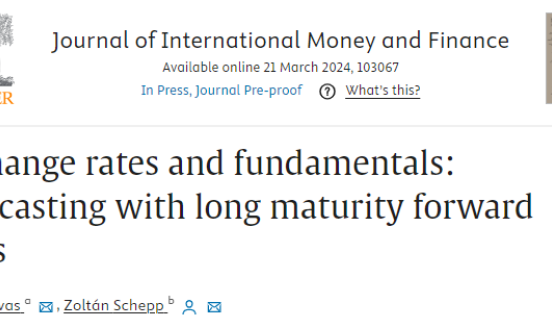
Exchange rates and fundamentals: Forecasting with long maturity forward rates

The idea that Europe’s economic performance is inferior to that of the United States is erroneous

Incorporating the impact of social investments and reforms in the European Union’s new fiscal framework
This paper proposes an approach for quantifying the impact of public investments and reforms on debt sustainability

Ukraine's accession is affordable — but corruption is the worry

Two years later: addressing long-term consequences of Russia’s invasion of Ukraine
The event marked the anniversary of Russia's invasion of Ukraine, focusing on discussions about sanctions, accession, and energy
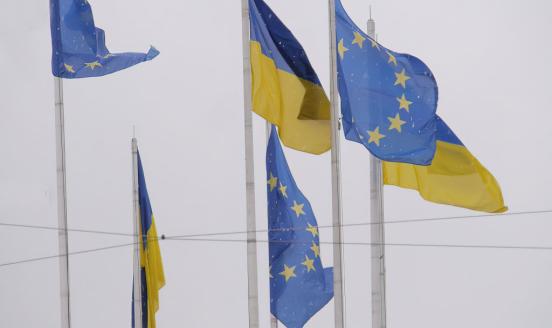
Ukraine’s path to European Union membership and its long-term implications
The war complicates the accession process, but Ukraine can work progressively towards meeting the entry conditions
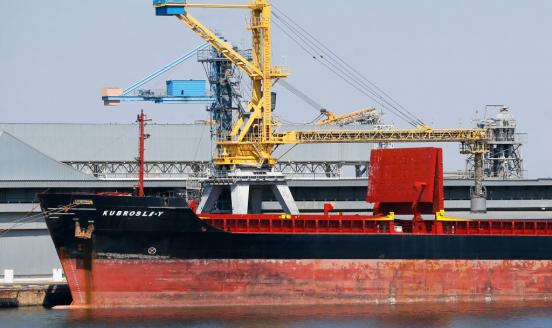
Russian foreign trade tracker

How can the European Union's Ukraine Facility assist Ukraine's accession path?

Global and regional Gini coefficients of income inequality
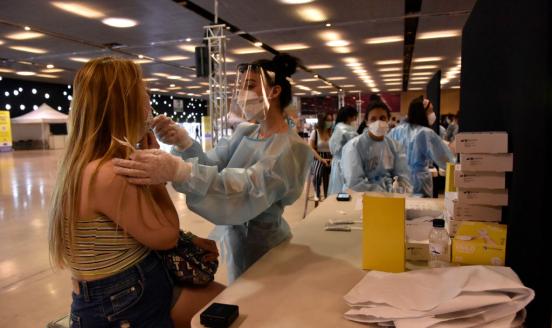
Income inequality hardly changed during the COVID-19 pandemic
Contrary to expectations, there was no widespread increase in either within-country or global income inequality during the pandemic

Bringing the reform of European Union fiscal rules to a successful close
EU fiscal rules must not unnecessarily restrict green investment.
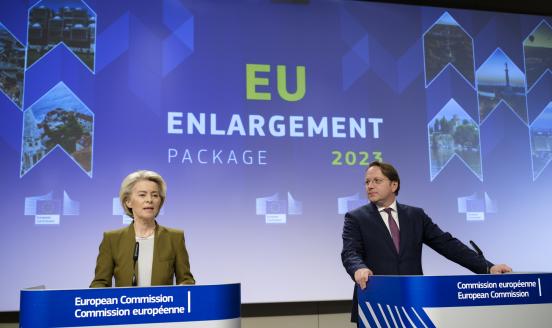
The benefits of bringing the Western Balkans into the European Semester
Integrating the Western Balkan countries into the European Union’s European Semester process is both feasible and desirable.
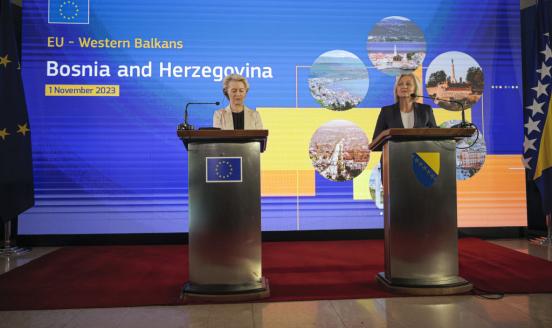
How should Western Balkan countries seize the opportunity of the EU’s new growth plan
At this event we focused on the EU's proposed growth plan for the Western Balkans

The European Union’s remarkable growth performance relative to the United States
The EU has outperformed the US on per-capita output growth; in terms of output per hour worked, some EU countries are as productive as the US

A quantitative evaluation of the European Commission’s fiscal governance proposal
This paper focuses on the fiscal adjustment that the first regulation would require of countries with debt above the treaty benchmarks.

The economic governance review and its impact on monetary-fiscal coordination

Bruegel Annual Meetings, 6-7 September 2023
A symphony in progress: shaping a new agenda for Europe

Divisia monetary aggregates for the euro area

EU trade and investment following Russia's illegal invasion of Ukraine

Future of Work and Inclusive Growth Annual Conference 2023
Annual Conference of the Future of Work and Inclusive Growth project
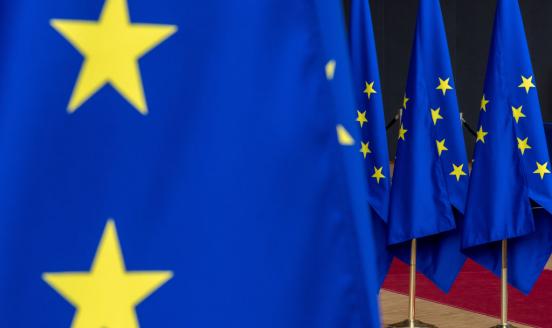
Fiscal rule legislative proposal: what has changed, what has not, what is unclear?
The proposed new fiscal rules constitute a major improvement from the current fiscal framework but missed an opportunity to foster green investment.
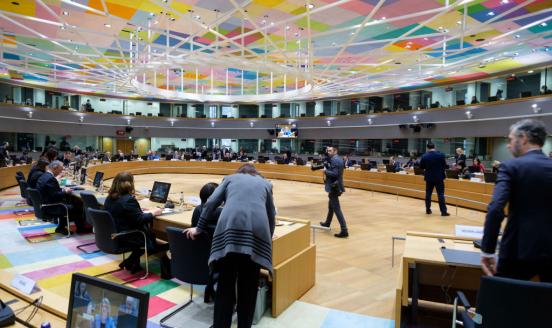
The longer-term fiscal challenges facing the European Union
Since 2020, the European Union has suffered two large shocks, which have created new fiscal challenges for the EU.
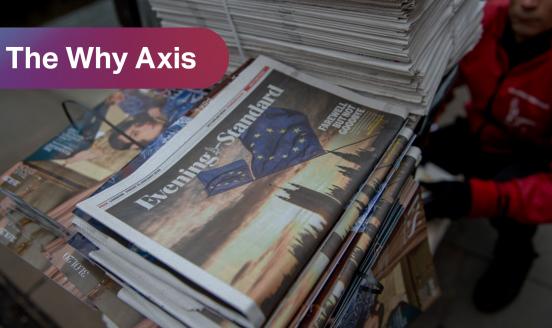
What results can be expected from the EU Recovery and Resilience Facility?

The EU Recovery and Resilience Facility falls short against performance-based funding standards
The rules and guidance underpinning EU economic recovery funds seek inputs and outputs, not results; this has led to uneven use of results indicators

The ‘Green Golden Rule’ for the Green Transition
Given the need to reduce large budget deficits, what are some strategies for increasing public climate spending?

Banking turbulence is not a reason to pause monetary tightening
Despite calls for interest rate hikes to be paused, both the ECB and Federal raised rates- which was the right decision.
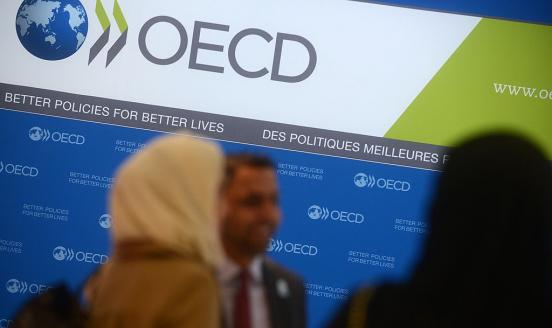
Collective bargaining is associated with lower income inequality
There is a negative correlation between collective bargaining coverage and inequality, but more research is needed to understand why.

Two crises, two continents: how the labour-market impacts have differed
The US economy was more resilient against the two recent global crises, while the EU did better in terms of jobs during and after the pandemic.
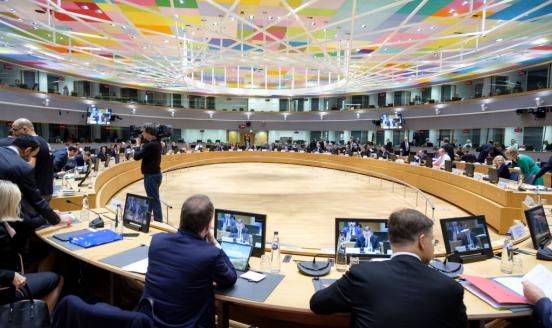
First lessons from the Recovery and Resilience Facility for the EU economic governance framework
This study draws out lessons for the future of the EU economic governance framework from certain aspects of the RRF design.

Talks@Bruegel: Inflation and unemployment with Joseph Gagnon
Invitation-only event with Joseph Gagnon, who will discuss the link between employment and inflation and its implications for macroeconomic policy.

European Union countries’ recovery and resilience plans
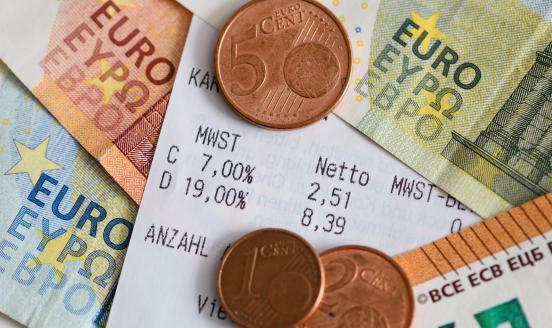
Economy: Inflation peaking, recession looming?
In 2023 we might see positive economic surprises in Europe: better-than-expected growth and lower-than-expected inflation.

The impact of the Ukraine crisis on international trade
The direct aim of trade sanctions seems to have been achieved, while Russia’s capacity to finance the war from fossil fuel revenues is bound to shrink

Five lessons from the Recovery and Resilience Facility for future crisis-response instruments
Presented as a new departure in EU policy-making, the EU’s Recovery and Resilience Facility (RRF) is now in its second year of implementation.

A Green Fiscal Pact for the EU: increasing climate investments while consolidating budgets
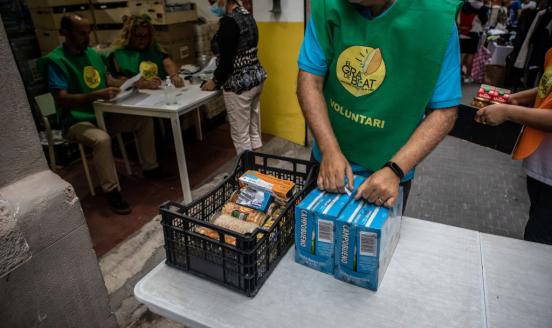
Inequalities, inclusion, and employment: a transatlantic perspective
What factors contribute to inequalities on both sides of the Atlantic, and how should policymakers address them?
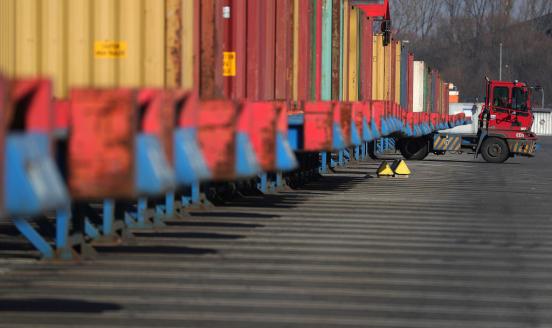
The sometimes puzzling differences in transatlantic earnings growth
Low-skill workers have seen faster wage growth than high-skill workers in many EU countries, contrary to the United States.

How European Union energy policies could mitigate the coming recession
The European Union faces recession, but the way in which policymakers manage the energy crisis will determine its depth and duration.

Euro area monetary asset demand and Divisia aggregates
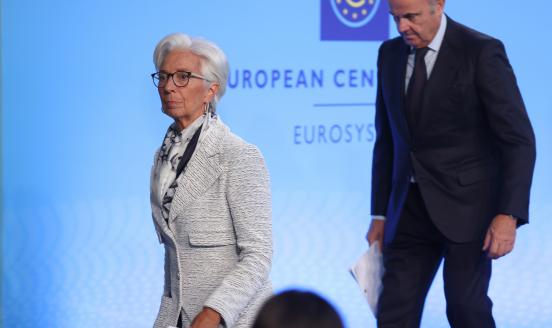
Tackling inflation: learning from the European Central Bank's six lapses
While mistakes unduly constrained rate hikes, gradual tightening is the right approach along with a new instrument to address energy bottlenecks.
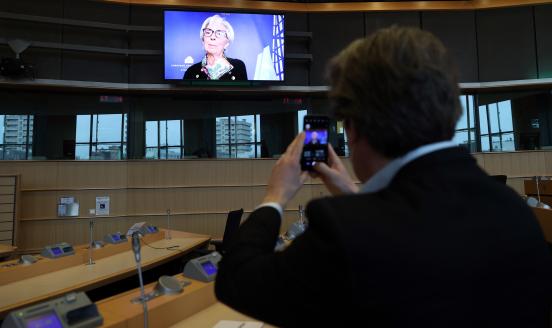
The ECB’s monetary tightening: a belated start under uncertainty
A paper assessing the ECB policy errors that occurred in the last year, and the appropriateness of the current monetary policy stance of the ECB.
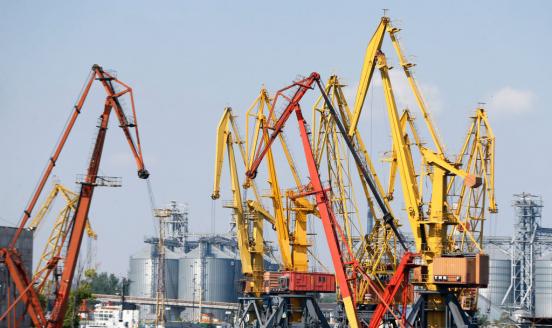
Russia’s huge trade surplus is not a sign of economic strength
Russia has recorded a record trade surplus, but more than half of its increase is due to the collapse of imports.

Bruegel Annual Meetings, 6-7 September 2022
The Annual Meetings are Bruegel's flagship event which gathers high-level speakers to discuss the economic topics that affect Europe and the world.

Legal options for a green golden rule in the European Union’s fiscal framework

Green public investment after COVID-19
How can the public sector meet the climate funding needs of the EU?

The implications for public debt of high inflation and monetary tightening
Expected increases in interest rates and reductions in real GDP growth rates will result in relatively small increases in public debt-to-GDP ratios.

Discretion lets Croatia in but leaves Bulgaria out of the euro area in 2023
Crucial decisions about whether a country can join the euro area depend on questionable discretionary decisions.

Technology, trade, work councils and income distribution: new insights from MICROPROD
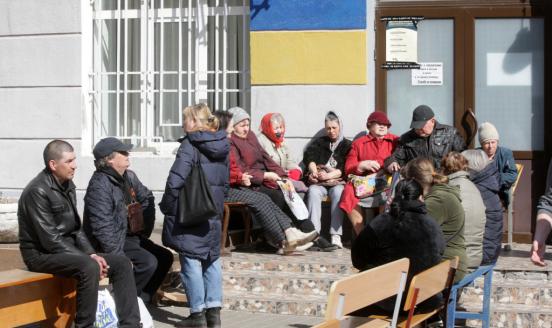
Bold European Union action is needed to support Ukrainian refugees
Hosting Ukrainian refugees could cost European Union countries in excess of €40 billion this year. A dedicated EU fund is needed to manage the burden.

Close cooperation for bank supervision: The cases of Bulgaria and Croatia
In-depth analysis on the banking supervision cooperation in Bulgaria and Croatia prepared for the European Parliament's Committee on Economic and Mone

How to reconcile increased green public investment needs with fiscal consolidation
The EU’s ambitious emissions reduction targets will require a major increase in green investments. This column considers options for increasing public

Productivity in transformative times
This Microprod policy conference discussed how productivity is affected by globalisation and digitisation.

How has growth changed what countries get from the European recovery fund?
Adjustments to growth forecasts mean some countries will get 10% more than expected and others 20% less in grants from the EU Recovery and Resilience
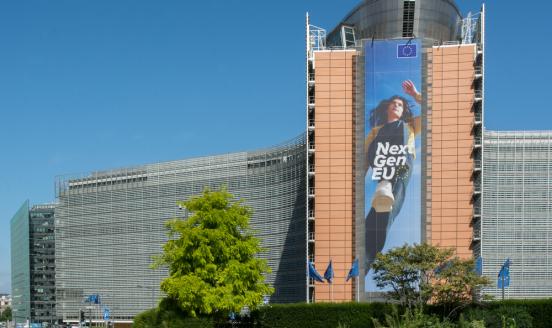
The puzzle of European Union recovery plan assessments
Identical European Commission assessments that EU countries’ recovery plan cost justifications are ‘medium-quality’ undermine trust in the assessments

A European climate fund or a green golden rule: not as different as they seem
Spending and borrowing via a non-redistributive EU climate fund or under a well-designed green golden rule would result in similar project implementat

Timely measurement of real effective exchange rates
This paper contributes to the measurement of monthly consumer price index-based real effective exchange rates with two main novelties.

European Green Deal beyond the Brussels climate bubble
How can the European Green Deal be implemented beyond Brussels?

Fiscal policy and rules after the pandemic
What are the possibilities for shaping the new fiscal policy?

Including home-ownership costs in the inflation indicator is not just a technical issue
The ECB’s preferred method to include owner-occupied housing services in the inflation indicator would involve an asset price.

The New Euro Area Inflation Indicator and Target: The Right Reset?
Testimony to the Monetary Dialogue Preparatory Meeting of the European Parliament's Committee on Economic and Monetary Affairs (ECON).

The new euro area inflation indicator and target: the right reset?
In-depth analysis on the European Central Bank's revised inflation target prepared for the European Parliament's Committee on Economic and Monetary Af

An overview of the Recovery and Resilience Plans
Testimony before the European Parliament’s Committee for Budgetary Control (CONT) on the topic "Capacity for proper expenditure controls of the increa

A green fiscal pact: climate investment in times of budget consolidation
A fiscal exit strategy must be put in place when the EU is pursuing the major goal of cutting its emissions

An in-depth look at the Italian Recovery and Resilience Plan
Bruegel Annual Meetings, Day 2 - A discussion of the largest national recovery plan.
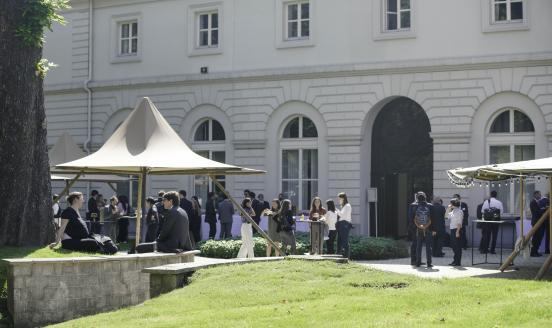
Bruegel Annual Meetings, 1-3 September 2021
The 2021 Annual Meetings gathered high-level speakers and participants to discuss how to recover from the crises brought on by the Covid pandemic

Will European Union recovery spending be enough to fill digital investment gaps?
The recovery facility will boost digital transformation, but questions remain whether it will be sufficient to achieve Europe’s digital ambitions.
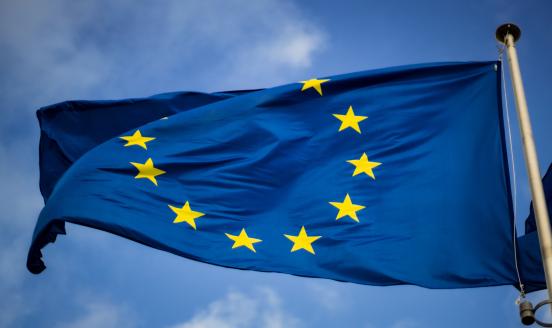
How to spend it? A closer look at the recovery plans
In this event, participants will take a closer look at the recovery plans submitted by EU countries.

The Recovery and Resilience Fund: Accelerating the digitalisation of the EU?
How can new EU funds supplement national digital and green funding and EU funds from the standard seven-year EU budget to accelerate digitalisation?

The great COVID-19 divergence: managing a sustainable and equitable recovery in the European Union
Policymakers must act to prevent lasting divergence within the EU and to prevent scarring from the fallout from the pandemic.
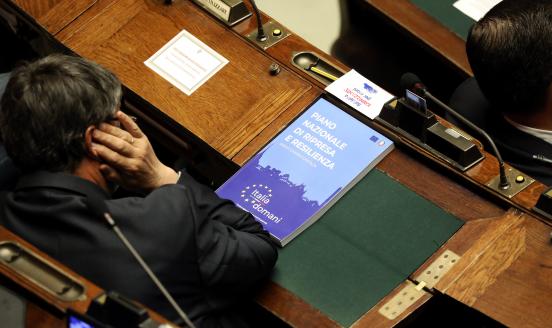
Setting Europe’s economic recovery in motion: a first look at national plans
Plans for spending European Union recovery funds submitted by the four largest EU countries reflect rather different priorities. So far, only Italy is
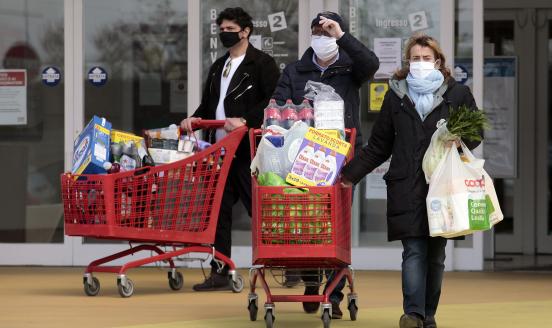
Living standards and financial resilience across Europe
What has the impact of the pandemic on households’ financial resilience been, and how should policy makers respond?

Wealth distribution and social mobility
This report explores the distribution of household wealth in the EU Member States and analyses the role of wealth in social mobility.

The unequal inequality impact of the COVID-19 pandemic
Less-educated workers have suffered most from job losses in the COVID-19 pandemic, and it is quite likely there was a significant increase in European

The EU’s fiscal stance, its recovery fund, and how they relate to the fiscal rules
Joint EU borrowing to boost the recovery, if not treated as national deficit and debt, will substantially ease rules-based fiscal adjustment needs in

European Union cohesion project characteristics and regional economic growth
A new approach, which estimates 'unexplained economic growth', provides insights into the types of European Union cohesion projects that produce bette

The nonsense of Next Generation EU net balance calculations
Estimates of payments countries will receive from the Next Generation EU instrument can be made with some degree of precision. But estimating countrie

When the future changes the past: fiscal indicator revisions
The 2020 pandemic economic shock has led to reassessment of fiscal policy measures in 2018 and earlier, because of faulty measurement of unobserved ou

Innovative approaches to monitoring the risks and impact of COVID-19
What new innovative tools can we use to measure real-time economic and social risk?

COVID-19 has widened the income gap in Europe
Workers with low-educational levels suffered far worse than others in terms of COVID-19 related job losses during the first half of 2020 in the EU. Jo
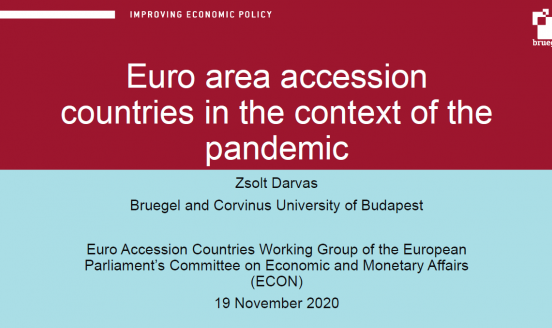
Euro area accession countries in the context of the pandemic
Testimony before the European Parliament on the subject of euro area accession.
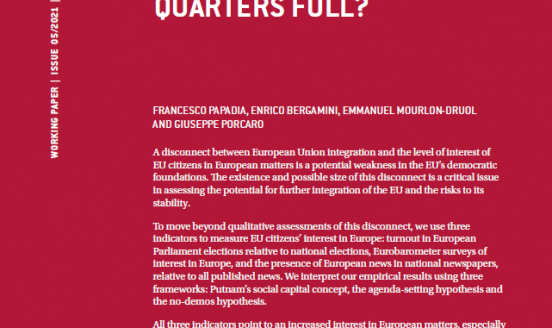
New life for an old framework: redesigning the European Union's expenditure and golden fiscal rules
Testimony before the European Parliament on the subject of EU fiscal policies.

Next Generation EU payments across countries and years
How much cake does everyone actually get and at what speed?
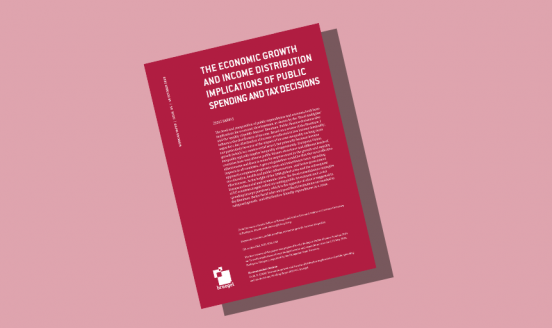
The economic growth and income distribution implications of public spending and tax decisions
European Union countries can reduce inequality of opportunity through public spending and tax decisions. Broadly, the most effective approach includes

New life for an old framework: redesigning the European Union's expenditure and golden fiscal rules
This briefing paper focuses on two aspects of the EU fiscal framework: whether an expenditure rule would be more reliable than a structural budget bal

Will European Union countries be able to absorb and spend well the bloc’s recovery funding?
To help finance the post-coronavirus recovery, the European Union is raising large amounts to pass on to its members. But absorption of EU funds is ty

Relocating production from China to Central Europe? Not so fast!
Western European imports from central Europe have fallen dramatically, while imports from China fell much less, and had already recovered to pre-COVID

Having the cake, but slicing it differently: how is the grand EU recovery fund allocated?
The European Commission’s original allocation mechanism really favoured lower-income countries and to a large extent was based on pre-COVID economic d

The EU’s recovery fund proposals: crisis relief with massive redistribution
Poorer European Union countries and those hardest hit economically by the COVID-19 crisis could obtain up to 15% of their GNI in grants and guarantees

Three-quarters of Next Generation EU payments will have to wait until 2023
Because of hurdles in designing, approving and implementing European Union programmes, less than a quarter of the €438 billion in grants planned under

An uncompromising budget
Apart from decisive European Central Bank measures, the EU-wide response to the COVID crisis had been rather weak until the Commission put on the tabl

Forecasting exchange rates of major currencies with long maturity forward rates
This paper presents unprecedented exchange rate forecasting results based upon a new model which approximates the gap between the fundamental equilibr

The fiscal consequences of the pandemic
The likely economic depression triggered by coronavirus will pose a serious fiscal challenge to some euro-area countries. Given the special circumstan
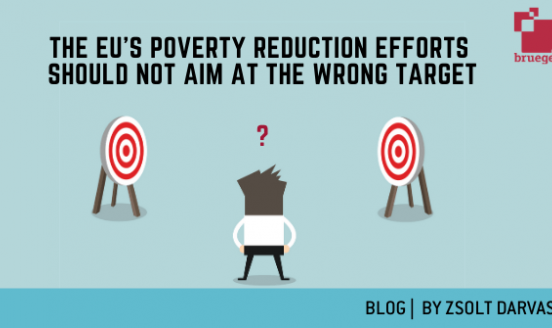
The EU’s poverty reduction efforts should not aim at the wrong target
The EU cannot meet its ‘poverty’ targets, because the main indicator used to measure poverty actually measures income inequality. The use of the wrong
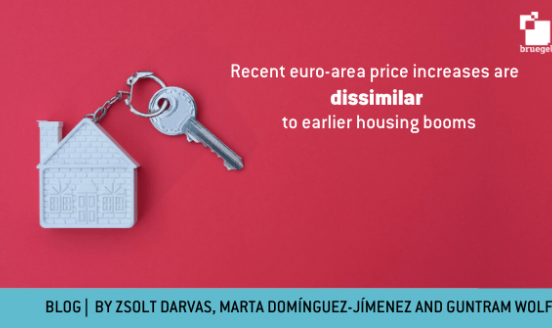
Recent euro-area house price increases are dissimilar to earlier housing booms
Current housing markets relative to those pre-crisis seem to be far less driven by mortgage credit, and the size of the construction sector has not in

From climate change to cyber attacks: Incipient financial-stability risks for the euro area
The European Central Bank’s November 2019 Financial Stability Review highlighted the risks to growth in an environment of global uncertainty. On the w

Resisting deglobalisation: the case of Europe
Trade and finance expanded in Europe after the financial crisis, while public support for globalisation is on the rise, supported by low unemployment.

How could net balances change in the next EU budget?
The gap between payments into the EU budget and EU spending in a particular country has importance when EU spending does not constitute European publi
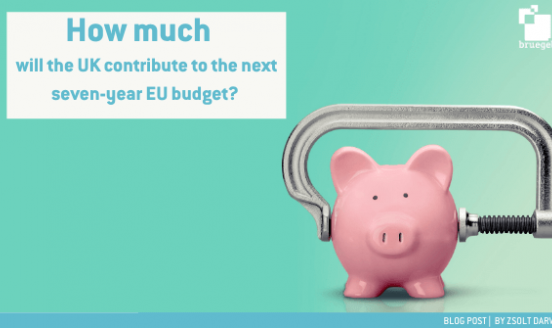
How much will the UK contribute to the next seven-year EU budget?
This post estimates the United Kingdom’s net contribution to the 2021-2027 EU multiannual budget at close to €20 billion, taking into account the most

A new look at net balances in the European Union's next multiannual budget
Whenever the European Union’s budget is discussed, much of the political focus is on net balances – whether countries pay in more than they receive –
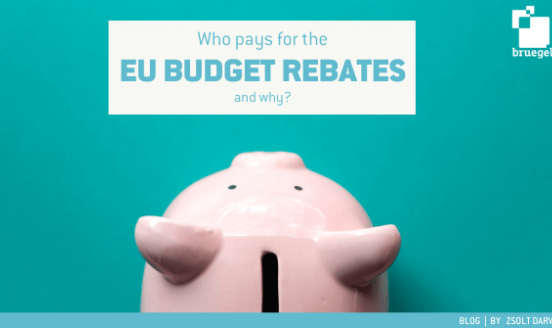
Who pays for the EU budget rebates and why?
A complex system of EU budget revenue corrections has been developed since the mid-1980s. I quantify their impacts: which countries pay and benefit fr
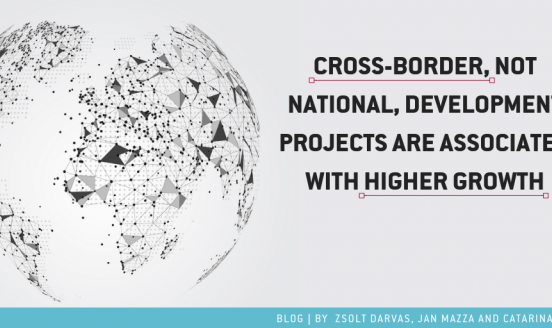
Cross-border, but not national, EU interregional development projects are associated with higher growth
Our calculations reveal that places where EU regional development projects bind together participants from different countries experience higher econo

With or without you: are central European countries ready for the euro?
The debate on euro adoption by central European EU countries has intensified in the last years. In this Policy Contribution the author does not review

Long term real interest rates fell below zero in all euro area countries
The 10-year real government bond yield, which is the nominal yield deflated by expected inflation, has fallen below zero in Italy and Greece, boosted
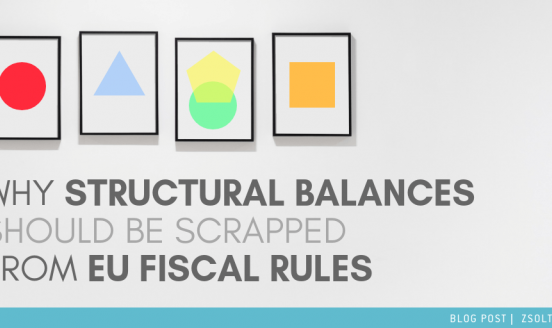
Why structural balances should be scrapped from EU fiscal rules
A prominent team from DG ECFIN of the European Commission challenged some of the criticisms of the EU’s methodology for estimating potential output an

Simple Rules for Better Fiscal Policies in Europe
Proposals to reform the euro area are on the agenda again. An overhaul of the complex set of European fiscal rules should be top priority on this agen
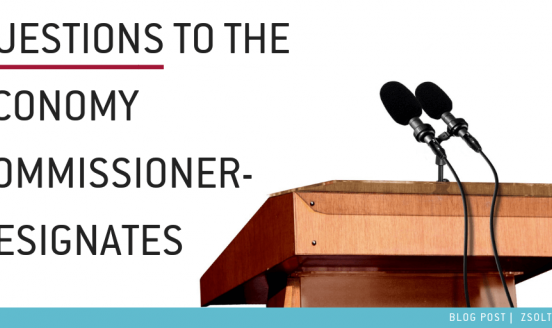
Questions to the economy commissioner-designates
European Commission President-elect Ursula von der Leyen disseminated her mission letters to commissioner-designates. In my opinion, the letters to ec

Bruegel Annual Meetings 2019, 4-5 September
The 2019 Annual Meetings featured the launch of Bruegel's memos to the new European Leadership, proposing how to deal with future policy challenges
Bruegel Annual Meetings 2019
Bruegel's 2019 Annual Meetings will be held on 4-5 September and feature the launch of Bruegel's Memos to the New European Commission.

Financial inclusion of SMEs for growth and job creation
How can increased access to finance benefit SMEs? What reforms are needed to encourage SME financial inclusion?

Uncertainty over output gap and structural-balance estimates remains elevated
The EU fiscal framework strongly relies on the structural budget balance indicator, which aims to measure the ‘underlying’ position of the budget. But

Effectiveness of cohesion policy: learning from the project characteristics that produce the best results
This study by Zsolt Darvas, Antoine Mathieu Collin, Jan Mazza, and Catarina Midões analyses the characteristics of cohesion policy projects that can c

A European atlas of economic success and failure
Economic growth was diverse across EU regions, yet it is crucial to control for region-specific factors in assessing growth performance. We find that

How to improve European Union cohesion policy for the next decade
This policy contribution investigates the performance of the design, implementation and effectiveness of cohesion policy, the most evaluated EU tool f

Global interpersonal income inequality decline: The role of China and India
Without China and India, global interpersonal income inequality in 143 countries was higher in 2015 than in 1988. Has the rest of the world really bec

EU enlargement 15th anniversary: Upward steps on the income ladder
Since their accession to the EU 15 years ago, the incomes of most central Europeans have increased faster than the incomes of longer-standing members
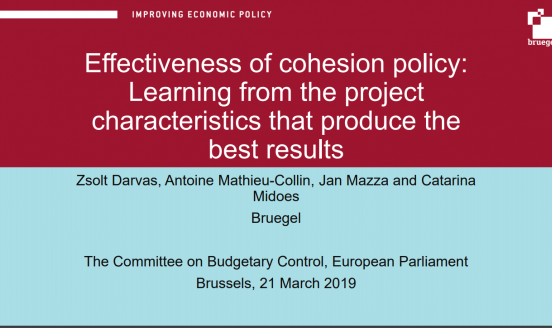
Effectiveness of cohesion policy: Learning from the project characteristics that produce the best results
Testimony at the Committee on Budgetary Control of the European Parliament.
Towards a new social contract
This event will look at a a proposal for a new social contract put forward by the World Bank.
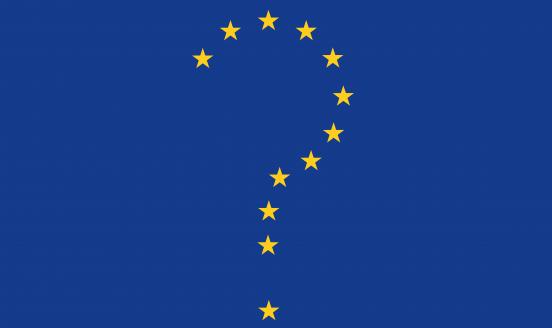
EU budget implications of a no-deal Brexit
A no-deal Brexit would mean the UK’s contributions to the EU budget fall to zero as of March 30th 2019. The author here calculates an estimate of the

Forecast errors and monetary policy normalisation in the euro area
What did we learn from the recent monetary policy normalisation experiences of Sweden, the United States and the United Kingdom? Zsolt Darvas consider

ECB’s huge forecasting errors undermine credibility of current forecasts
In the past five years ECB forecasts have proven to be systematically incorrect: core inflation remained broadly stable at 1% despite the stubbornly p
The future of the External Investment Plan in the next MFF
What are the challenges for implementation of the new EIP?

Reconciling contradictory forces: financial inclusion of refugees and know-your-customer regulations
The authors contributed to the new issue of the 'Journal of Banking Regulation' with a paper on financial inclusion initiatives and banking regulation

European fiscal rules require a major overhaul
In this Policy Contribution prepared for the French Conseil d’Analyse Économique, the authors assess current European fiscal rules and propose a major
Asia-Europe Economic Forum 2018 - Closed-door
This year's Asia-Europe Economic Forum (AEEF) will be held in Brussels on 17-18 October

Greece: What to expect after the bail-out
After being under the close scrutiny of three financial assistance programmes since May 2010, Greece has finally left the bail-out in August 2018. How

Excess liquidity and bank lending risks in the euro area
In this Policy Contribution prepared for the European Parliament’s Committee on Economic and Monetary Affairs (ECON) as an input to the Monetary Dialo

The economic case for an expenditure rule in Europe
Proposals for reforming the euro area back on the agenda. An overhaul of the European fiscal rules should be on high on this agenda, because the curre

Reforming Europe's fiscal framework
This event will discuss reforming Europe's fiscal framework in order to make it less complex and more effective.

The EU’s Multiannual Financial Framework and some implications for CESEE countries
Bruegel scholars Zsolt Darvas and Guntram Wolff contributed to the September 2018 edition of the OeNB's Focus on European Economic Integration.

Should central European EU members join the euro zone?
Eurozone membership (or the use of a fixed exchange rate) was not a factor determining economic success in Central Europe. There were both good and ba
Youth UP Europe: transforming the migration narrative
This joint Bruegel - European Youth Forum event will discuss how we can shift the narrative of migration to a more positive one ahead of the European

The macroeconomic implications of healthcare
Health-care systems play a crucial role in supporting human health. They also have major macroeconomic implications, an aspect that is not always prop
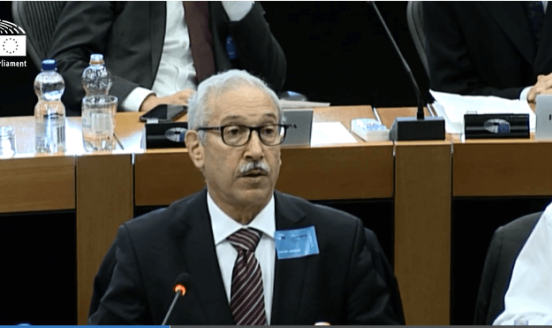
The role of independent expertise in legislative process
Testimony before the European Parliament Committee on the Internal Market and Consumer Protection (IMCO).

EU income inequality decline: Views from an income shares perspective
Over the past decade, the income share of low earners has increased in the EU while that of top earners has slightly declined. Although the upward con
For a stronger and more integrated Europe
This event will feature the presentation of the Economic Survey of the European Union 2018 and Economic Survey of the Euro Area 2018.

The Commission’s proposal for the next MFF: A glass half-full
The Commission’s proposal for the next Multiannual Financial Framework provides a good basis for subsequent negotiations and includes a number of bold

EU funds for migration, asylum and integration policies
This study provides an overview, analysis and evaluation of how EU funds for migration, asylum and integration policies have been used. Using publicly
EU budget post 2020: the next MFF
This is a closed-door event where we will discuss the EU budget post-2020.

How large is the proposed decline in EU agricultural and cohesion spending?
Cohesion spending is proposed by the Commission to increase by 6% in the next MFF, but inflation is expected to reduce the real value of such spending

European income inequality begins to fall once again
Following almost a decade of relative stability, income inequality within the EU recorded a sizeable decline in 2016, reaching its lowest value since

Global income inequality is declining – largely thanks to China and India
Income inequality among citizens of 146 continues to fall, though at a somewhat reduced pace, according to the updated Bruegel dataset. Income conver

Greece must capitalise on its growth momentum
Better-than-expected growth performance reflects the underlying positive changes in the Greek economy – but net investment is in fact negative, while
Could uncertainty derail the European recovery?
It is a contradictory time for Europe. The economy is recovering but the political climate is uncertain. There is excitement about common projects but

Rethinking the European Union’s post-Brexit budget priorities
There will be a €94 billion Brexit-related hole in the EU budget for 2021-27 if business continues as before and the United Kingdom does not contribut
Why is it so hard to reach the EU’s poverty target?
Why is it so hard to reach the Europe 2020 ‘poverty’ target? What does the poverty indicator actually measure? Why was the Lisbon strategy goal of tac
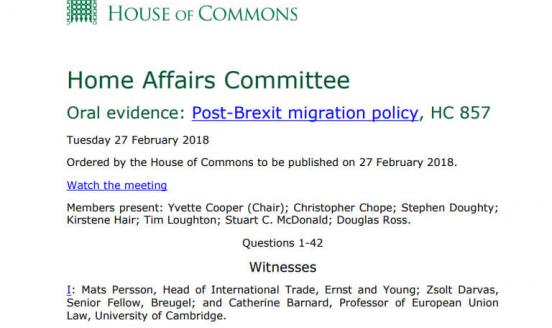
Post-Brexit migration policy
On 27 February 2018 Zsolt Darvas testified at the Home Affairs Committee of the House of Commons. This inquiry explores the potential trade-offs betwe

Beyond border control, migrant integration policies must be revived
Border control and burden-sharing of refugees is just one aspect of immigration policies. Greater financial inclusion and the tailoring of regulations

What is the financial balance of EU membership for central Europe?
EU membership led to major financial and economic advantages to central European Member States, partly by encouraging foreign investment. Widespread f
Europe’s immigration and integration challenges: Financial and labour market dimensions
The event, organised by Bruegel in cooperation with the Institute for International Affairs will discuss these and related questions and will also fea
Integration of migrants in the EU
This event will discuss the integration of migrants in the EU as well as the EU's response to the recent refugee crisis

The ever-rising labour shortages in Europe
Historically high labour shortages in most central-eastern and north-western EU countries suggest that the immigration of central Europeans to north-w

People on the move: migration and mobility in the European Union
Migration is one of the most divisive policy topics in today’s Europe. In this publication, the authors assess the immigration challenge that the EU f

Optimistic UK business confidence indicators predict smooth Brexit
UK business confidence indicators hardly fell after the Brexit vote in 2016 and have been increasing steadily since. The most likely reason is an expe
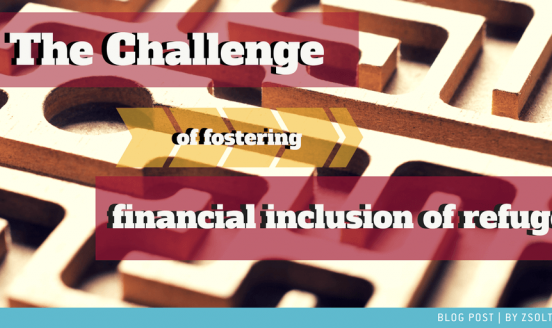
The challenge of fostering financial inclusion of refugees
Creation of a European identification for refugees and a pan-European registry would encourage better financial inclusion, along with clear guidelines

Better policies for people on the move
This event discussed the impact and integration of migrants as well as national and European immigration policy challenges.
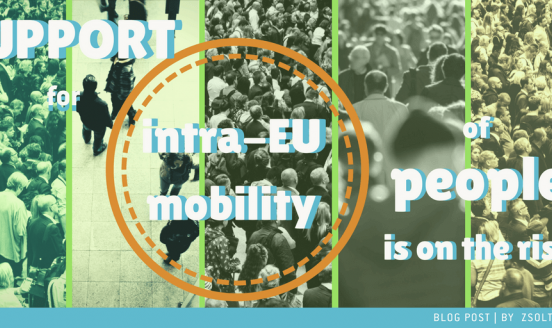
Support for intra-EU mobility of people is on the rise
Europeans’ enthusiasm for immigration from other EU countries is steadily increasing –two-thirds of the EU population, on average, now support it.
Health care and macro-economics in Europe
What are the strengths and challenges of health care systems in each EU country? What are the common policy priorities and opportunities for EU value

How the EU has become an immigration area
Natural change of EU28 population (the balance of live births and deaths) has fallen from high positive values in the 1960s to essentially zero recent

Why US investors earn more on their foreign assets than Germans
The United States benefits from large yields on its foreign assets relative to foreign liabilities, while in most continental European countries forei

Returns on foreign assets and liabilities: exorbitant privileges and stabilising adjustments
Large stock of foreign assets and liabilities could foster international risk diversification. US, British and Japanese investors earn high yields on
Sustainable growth in transition countries
This event will feature a presentation of the EBRD Transition Report 2017-18.
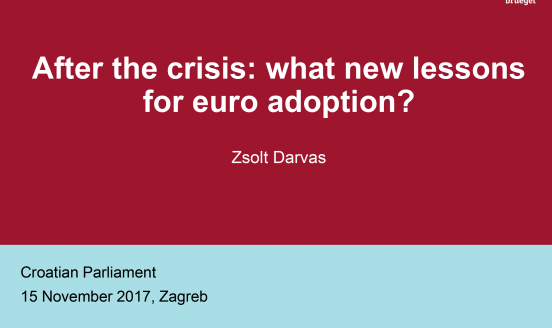
After the crisis: what new lessons for euro adoption?
Key learning for euro adoption lies within the experience of southern euro member states and the macroeconomic performance of euro ‘ins’ and ‘outs’ am

Revision of the Posted Workers Directive misses the point
Instead of the futile proposed revision, the focus should be on the fight against bogus self-employment, social security fraud and undeclared work.
Europe and Japan: Monetary policies in the age of uncertainty
The 5th Bruegel - Graduate School of Economics, Kobe University conference will focus on monetary policy.

Employment in Europe and the US: the EU’s remarkable strength
The common narrative that the US labour market outperforms the EU is not as trustworthy as overall unemployment figures imply. There is a complex inte
Global Excess Imbalances: How worried should we be?
This event will discuss excess external imbalances, risks from current configuration of imbalances, and potential policy responses to help correct imb
14th Asia Europe Economic Forum (AEEF)
The 14th Asia Europe Economic Forum will be held in Seoul on 20-21 September 2017.

Bruegel Annual Meetings 2017, 7-8 September
The Annual Meetings are Bruegel’s flagship event.
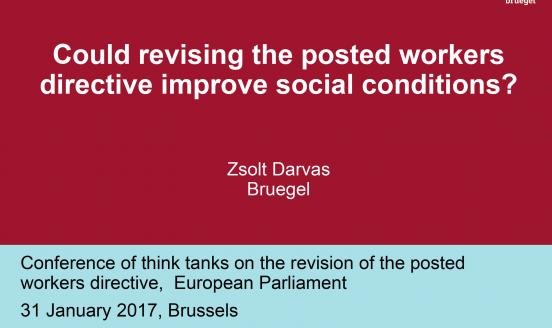
Could revising the posted workers directive improve social conditions?
This presentation was delivered in Brussels on 31 January 2017 at a hearing of think-tanks, to advise the European Parliament on the revision of the P
Exiting the European Union Committee
On 19 April 2017 Zsolt Darvas appeared as a witness at the Exiting the European Union Committee, the House of Commons, United Kingdom.

Combating inequalities as a lever to boost job creation and growth
This presentation was delivered in Brussels at the Employment and Social Affairs Committee (EMPL) of the European Parliament on 29 May 2017.

Is Greece’s labour market bouncing back?
After rapid increases in unemployment and large wage reductions, Greece’s labour market is showing signs of recovery. Certain sectors of the economy a
Inclusive growth: global and European lessons for Spain
Can manufacturing still be a driver for inclusive growth around the world? What European and national policies can foster inclusive growth in Europe?
Debt relief or a fourth financial assistance programme for Greece?
The Eurogroup faces a difficult choice on Greece — implementing a debt reduction plan drastic enough to make a return to market borrowing possible, or
Europeans rediscover enthusiasm for globalisation
The general political mood on both sides of the Atlantic seems to suggest declining public support for globalisation, but people in the EU increasingl
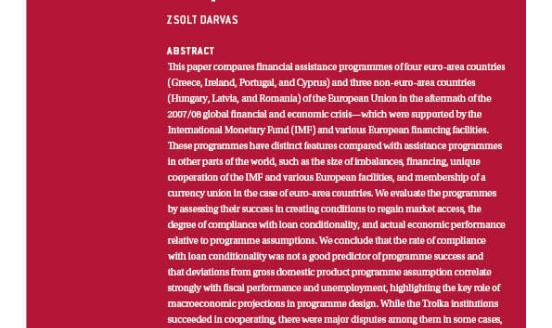
Regional and global financial safety nets: the recent European experience and its implications for regional cooperation in Asia
Comparing and evaluating financial assistance programmes of four euro-area countries (Greece, Ireland, Portugal, and Cyprus) and three non-euro-area c
Micro- and macro-based methods in assessing the impact of investment
This workshop will discuss methods for accurately evaluating the performance of public and private investment initiatives.
The UK’s Brexit bill: what are the possible liabilities?
The EU-UK financial settlement will be a complex part of the Brexit negotiations. Here the authors estimate that at end-2018 the EU will have outstand
Brexit bill negotiators must answer these 12 questions
Is Brexit a divorce, or is the UK leaving a club? This is the first question to answer as negotatiors discuss the key aspects of the EU-UK financial s
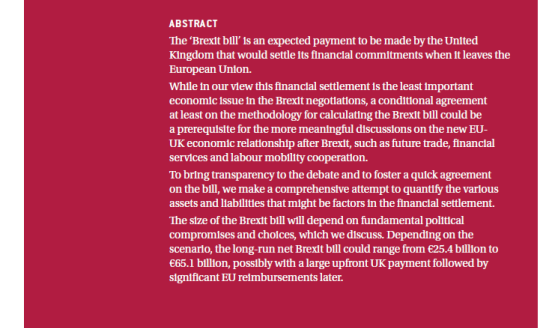
Divorce settlement or leaving the club? A breakdown of the Brexit bill
To bring transparency to the debate on the Brexit bill and to foster a quick agreement, the authors of this Working Paper make a comprehensive attempt
European spring - Trust in the EU and democracy is recovering
Trust in the EU and satisfaction with democracy are returning in southern European countries, where citizens’ confidence in European institutions was
Brexit: EU budget
On 25 January 2017 Zsolt Darvas appeared as a witness at the House of Lords Select Committee on the European Union, Financial Affairs Sub-Committee.
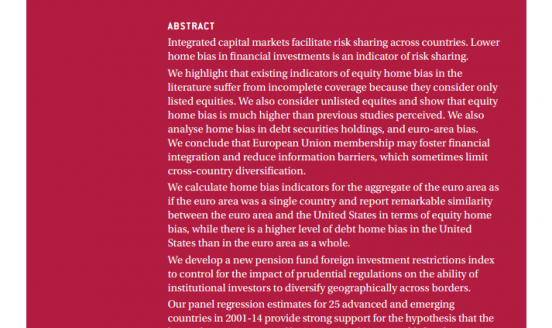
Institutional investors and home bias in Europe’s Capital Markets Union
Zsolt Darvas and Dirk Schoenmaker find strong support for the hypothesis that the larger the assets managed by institutional investors, the smaller th
The Brexit bill: uncertainties in the estimate of EU pension and sickness insurance liabilities
Pension and sickness insurance liabilities for EU staff could be an especially contentious part of negotiations on an EU-UK financial settlement: the
The UK’s Brexit bill: could EU assets partially offset liabilities?
The ‘Brexit bill’ is likely to be one of the most contentious aspects of the upcoming negotiations. But estimates so far focus largely on the EU costs
Questionable immigration claims in the Brexit white paper
The UK government's white paper on Brexit suggested that the EU's "free movement of people" has made it impossible to control immigration. This seems
Brexit: UK-EU movement of people
On 18 January 2017 Zsolt Darvas appeared as a witness at the House of Lords Select Committee on the European Union, Home Affairs Sub-Committee.

Why is it so hard to reach the EU’s ‘poverty’ target?
The ‘poverty’ target set by the European Commission aims to lift “over 20 million people out of poverty” between 2008 and 2020 in the EU27. Progress t
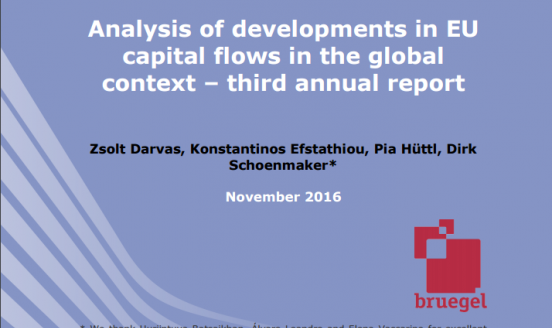
Analysis of developments in EU capital flows in the global context (3rd annual report)
The purpose of this report is to provide a comprehensive overview of capital movements in Europe in a global context.
Explaining inequality
Is technological progress behind growing income inequality? No, according to Zsolt Darvas, who argues that redistribution and the regulation of certai

EU economic governance: euro area periphery lessons for Central and Eastern European countries
An analysis of macroecnomic developments shows that Central and Eastern European (CEE) EU member states fared much better in the aftermath of the cris
Transition for all: equal opportunities in an unequal world
How inclusive is growth in transition countries? Post-communist countries are becoming more prosperous but many people are being left behind, risking
Labour mobility after Brexit
What will Brexit mean for the free movement of workers between the UK and the EU?
Income inequality has been falling in the EU
The properly measured EU-wide Gini coefficient of disposable income inequality shows that inequality in the EU as whole declined in 1994-2008, after w
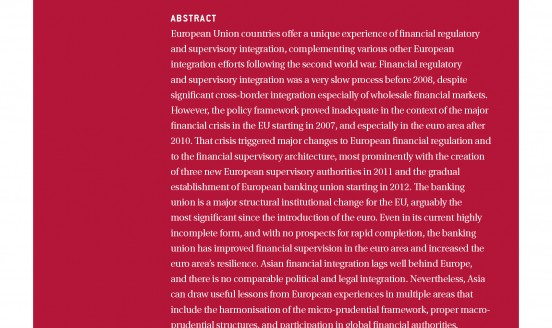
Reform of the European Union financial supervisory and regulatory architecture and its implications for Asia
This Working Paper reviews recent developments in the EU’s financial supervisory and regulatory architecture with a view to draw out lessons for regi
Income inequality boosted Trump vote
Our early econometric analysis shows that Donald Trump performed more strongly in states with higher income inequality. He also did better in states w

Some are more equal than others: new estimates of global and regional inequality
In this Working Paper, Zsolt Darvas estimates the global and regional distribution of income and calculates statistics of global and regional income i

An anatomy of inclusive growth in Europe
This Blueprint offers an in-depth analysis of inequalities of income and wealth in the EU, as well as their causes and consequences.
Innovation and economic reform in Europe and Japan
This event is co-organised by Bruegel and the Kobe University Graduate School of Economics.
Inclusive growth in the European Union
Why is inclusive growth important and how do the EU’s social problems differ from social problems in other parts of the world?
From crisis management to launching economic growth
What have been the most effective strategies in limiting the impact of the economic crisis in Europe? What challenges lie ahead? Bruegel's 10th annive

Bruegel Annual Meetings 2016, 6-7 September
The Annual Meetings are a high point in Bruegel's calendar.
Bruegel Annual Meetings 2016
The Annual Meetings are a high point in Bruegel's calendar.
Single market access from outside the EU: three key prerequisites
In relative terms, Norway’s current net financial contribution to the EU is similar to the UK’s. Switzerland and Liechtenstein pay surprisingly little
Brexit vote boosts case for inclusive growth
In the United Kingdom’s Brexit referendum, income inequality and poverty boosted ‘leave’ votes, in addition to geographical differences and larger sha
Does the euro area need a sovereign insolvency mechanism?
The sovereign debt crisis shook the Euro to its foundations. It soon became clear that there was no mechanism to allow a tidy insolvency of a state wi
No Lehman moment on currency markets after Brexit vote
While the pound sterling has lost a lot of its value right after the Brexit vote, from a historical perspective neither the fall of the exchange rate,
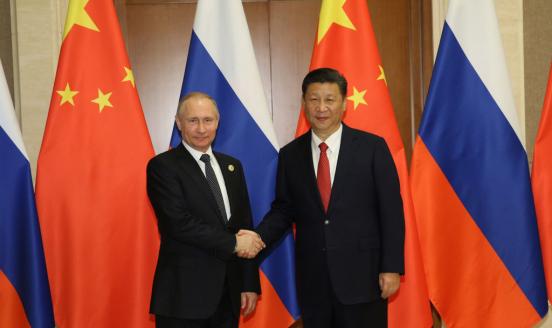
China-Russia relations and their impact on Europe
The economic ties between China and Russia are growing. How will this relation affect Europe?
Implementation of European Semester recommendations worsens further
Economic policy coordination in the EU hardly works: the initially modest implementation has worsened further.
What is the age profile of UK immigrants?
The bulk of immigrants to the UK from 2008-2014 were 20-30 years old, and many of them are in work. But as UK unemployment is close to a historical lo
Is Greek public debt unsustainable?
Greek public debt does not look sustainable if the country has to return to market borrowing at the end of the third bail-out programme, but could be
How to reform EU fiscal rules
The current inefficient European fiscal framework should be replaced with a system based on rules that are more conducive to the two objectives of pu
The structural budget balance limbo
A key indicator in the EU’s fiscal framework is the structural budget balance, but estimates of the indicator by the European Commission, IMF and OECD
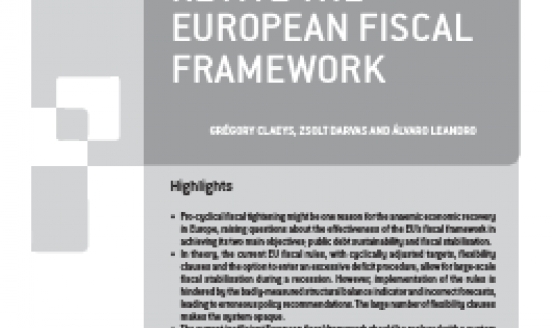
A proposal to revive the European Fiscal Framework
The current European fiscal framework is inefficient. It should be replaced with a system based on rules more suited to the two core objectives: publ
"Social dumping" and posted workers: a new clash within the EU
European companies often post employees to another EU country to work there temporarily. These ‘posted workers’ must be paid at least the minimum wag

A fiscal framework for the EU
Doubts about the fiscal sustainability of various member states have led Europe to enact greater coordination and surveillance. But are these policies

Analysis of developments in EU capital flows in the global context (2nd report)
The purpose of our report is to provide a comprehensive overview of capital
movements in Europe in a global context.
Oil prices and inflation expectations
The price of crude oil has fallen even further in recent weeks, as have financial market measures of inflation expectations in the euro area, the US a
Has ECB QE lifted inflation?
Euro-area headline inflation has remained close to zero since the ECB stepped up its quantitative easing programmes in early 2015, but this does not m
Challenges for Europe and Germany: a view from the German Council of Economic Experts
What are the key challenges facing Europe's largest economy, and what will Germany's responses mean for the EU?
Real exchange rates in conflict zones
Several countries experiencing conflict have been able to maintain a stable nominal exchange rate and thereby their real exchange rates were either st
Naughty students or the wrong school: why is the European Semester proving ineffective?
The fundamental problem of economic policy coordination in the EU is that national policymakers are accountable to their national parliaments and focu
Diversifying funding for growth in transition countries
Debt levels in transition economies have risen by 25% relative to GDP since the financial crisis, yet there is still a huge gap in growth-friendly inv
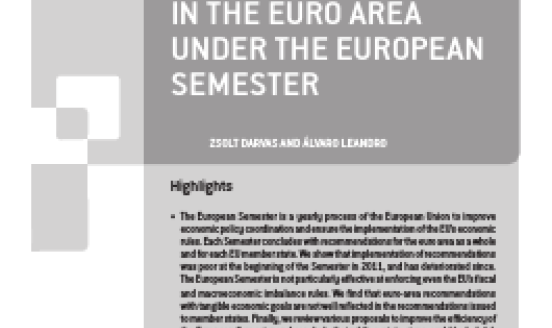
The limitations of policy coordination in the euro area under the European Semester
This paper assesses economic policy coordination in the euro area under the European Semester. Despite the collective decision to create this new syst
Economic governance of the EU: Quo Vadis?
This event will address topics of central interest in current EU policy debates: fiscal and competitiveness coordination, financial union and the dive
Structural Reforms: dynamic growth impact and policy challenges
What are the beneficial effects of product market reforms? What progress have Spain and Italy made in the past years and what challenges do they still
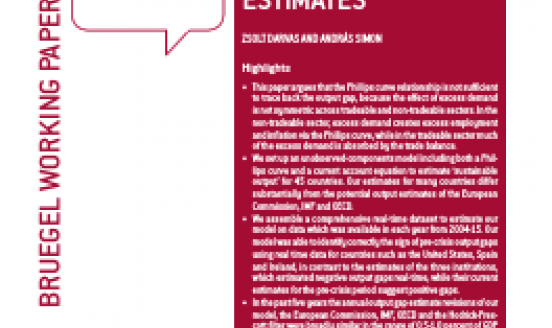
Filling the gap: open economy considerations for more reliable potential output estimates
This paper proposes a novel structural model to estimate the equilibrium level of output and reports
results for 45 countries. The model is conceptua
12th Asia Europe Economic Forum (AEEF)
This year's conference is entitled "Global Governance of Public Goods: Asian and European Perspectives".
Inclusive growth – how reducing inequality can boost growth
The global financial recession has left many advanced countries tackling difficult legacies, characterised by weak productivity and subdued wage growt
Bruegel's Annual Conference
Bruegel's Annual Conference is a closed-door event with three panel discussions on banks and capital markets, growth perspectives, and monetary policy
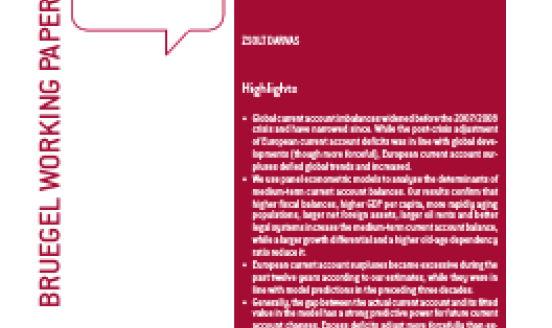
The grand divergence: global and European current account surpluses
This Working Paper assesses various explanations for the EU’s increased current account surpluses.
Waiting for G-Day
With a final decision on Greece fast approaching, what is the worst-case scenario: bailout or Grexit?
Choices after the Greferendum
On Sunday, with a sizeable majority, the Greek people voted down the proposals of the country’s official lenders. What’s next? We see three main optio
A democratic Europe should allow Greek people to decide on their future
Mr Tsipras’s call for the 5 July referendum about the Eurogroup proposal is an ideal outcome for official creditors. Zsolt Darvas argues that at
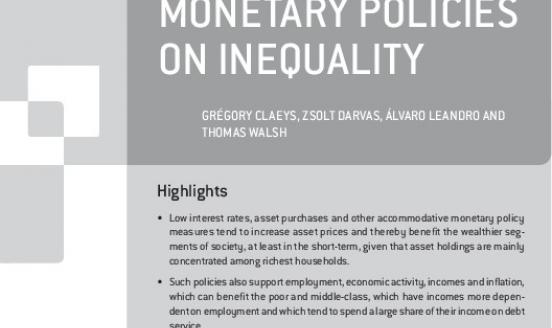
The effects of ultra-loose monetary policies on inequality
This Policy Contribution was prepared for the European Parliament Committee on Economic and Monetary Affairs. It assesses the impact of ultra-loose mo
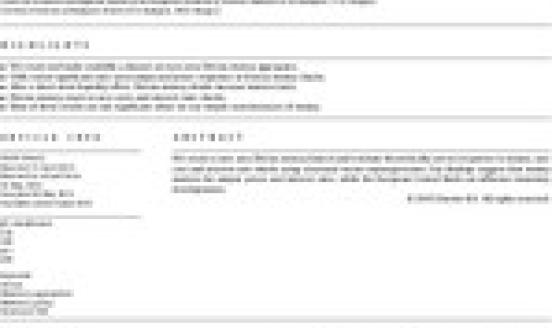
Does money matter in the euro area? Evidence from a new Divisia index
Zsolt Darvas created a a dataset on euro-area Divisia-money aggregates. In this paper, Zsolt estimates theoretically correct responses to money,
Is Greece destined to grow?
There is much talk about the impasse between Greece and its official lenders in their bail-out negotiations, so I thought I would write about somethin
Mind the gap (and its revision)!
In this post Zsolt Darvas presents an analysis of the revisions made to output gap estimates between 2001 and 2015 by the European Commission and the
Will Greece run out of cash?
For many weeks now it has been regularly reported that Greece will run out of money if an agreement is not reached with the official lenders in the ne
Money growth in the euro area is speeding up
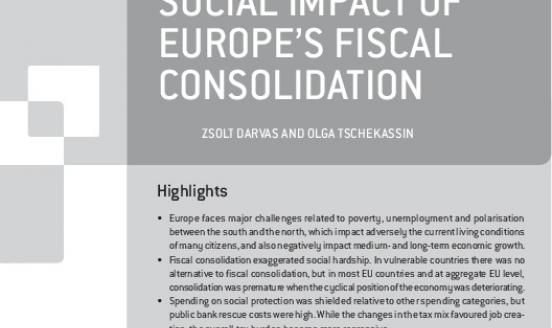
Poor and under pressure: the social impact of Europe's fiscal consolidation
This Policy Contribution evaluates social indicators that can have a bearing on poverty, looks at the fiscal consolidation strategies of EU member sta
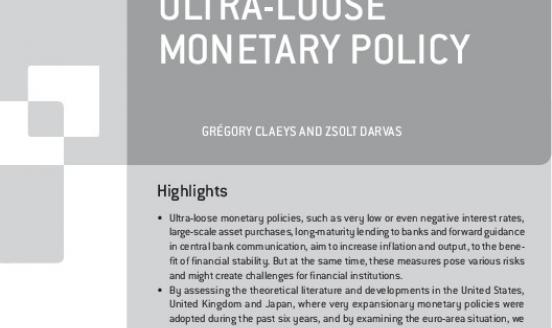
The financial stability risks of ultra-loose monetary policy
This Policy Contribution was prepared for the European Parliament Committee on Economic and Monetary Affairs. It draws lessons for the euro-area based
Should other Eurozone programme countries worry about a reduced Greek primary surplus target?
In this post Zsolt Darvas assesses the possible reaction of other Eurozone programme countries to a reduction in the Greek primary surplus target from
Europe needs a lasting solution for the Greek problem
The talks between the new Greek government and Eurozone partners turned out to be as hectic and as tough as expected. Greece wants to get debt relief
The maths behind an amended Greek plan
While Mr Mr Varoufakis’s plan was received coldly by euro-area partners, recent media reports suggest that a compromise is in the making. In this
A major step towards a Greek compromise
Following a week of fright after the Greek elections, during which various statements by the new Greek government have raised the spectre of Grexit, F
Greek choices after the elections
In the days ahead of the Greek snap elections on 25 January 2015 a huge range of opinions has appeared on what Greece and its lenders should do. One c
Real exchange rates after the Swiss tsunami
The surprise abolition of the 1.2 Swiss franc/euro exchange rate floor by the Swiss National Bank sent shock waves to currency markets. The instant re
Why a Grexit is more costly for Germany than a default inside the euro area
Direct losses for Germany would be much larger if Greece was to exit the euro.
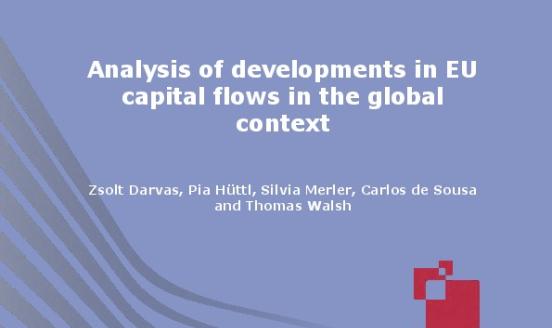
Analysis of developments in EU capital flows in the global context
This report reviews the key theoretical foundations underlying the benefits and risks of net capital flows, in particular large, persistent inflows or
How to reduce the Greek debt burden?
Since Greece achieved a primary surplus of 2.7 percent of GDP in 2014 (which is expected to increase further in 2015), and there are uncertainties rel
The convergence dream 25 years on
The 25th anniversary of the fall of the Berlin wall was widely celebrated – rightly so. The fall of communism opened the way for democracy, personal f
Licht- und Schattenseiten einer Gemeinsamen Arbeitslosenversicherung
Die Bruegel-Forscher Grégory Claeys, Zsolt Darvas und Guntram B. Wolff gehen der Frage nach, wie die Verwerfungen am Arbeitsmarkt im Euroraum behoben
Central bank rates deep in shadow
Measuring the impact of monetary policy on the economy at the zero lower bound is difficult. After 2008, central banks cut policy rates close to zero
Money matters in the euro area
Would you be indifferent between holding cash in your wallet and holding a two-year maturity bond of a bank? If not, you should be interested in Divis
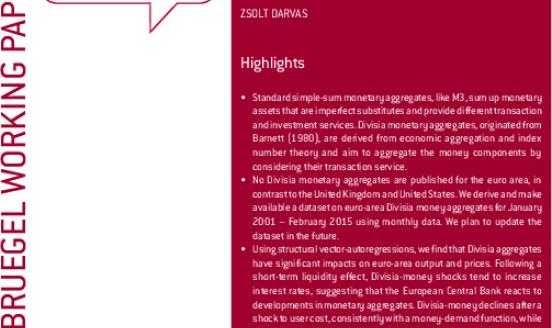
Does Money Matter in the Euro area? Evidence from a new Divisia Index
The purpose of this paper is to examine the possible role of money shocks on output and prices in the euro area.
New IMF growth forecasts: EU revised downward, once again
The IMF published its new World Economic Outlook today (see the report here and the database here). Once again, euro-area’s outlook has been revised d
The European Investment Bank should invest more, not less
The EIB has played to some extent a counter-cyclical stabilising role by increasing its investment in 2009 and in 2013 and by investing more in h
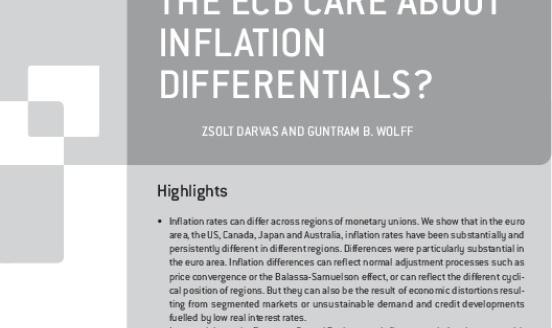
So far apart and yet so close: Should the ECB care about inflation differentials?
This Policy Contribution was prepared for the Preparatory meeting with Monetary experts panel. It explains that it is crucial to keep the average infl
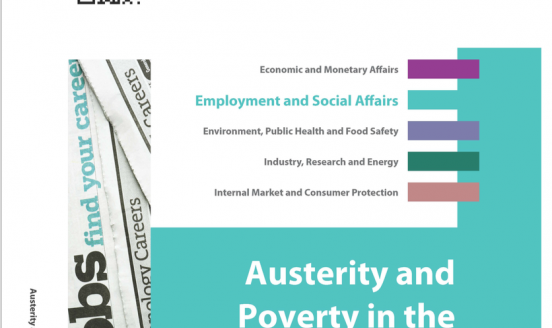
Austerity and Poverty in the European Union
This study provides to the Committee for Employment and Social Affairs of the European Parliament with an analysis of the speed and composition o
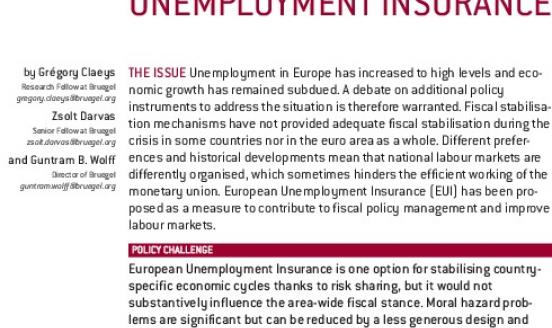
Benefits and drawbacks of European Unemployment Insurance
European Unemployment Insurance is one option for stabilising country specific economic cycles thanks to risk sharing, but it would not substanti

EU to DO 2015-2019
Memos to the new EU leadership.
Towards a European unemployment insurance?
The Italian Presidency of the EU has asked Bruegel to give a presentation to European Labour and Social Ministers at the informal EPSCO meeting in Mil
Despite lower yields, euro-periphery is not yet out of the woods
Do these undoubtedly benign developments suggest that the three euro-periphery countries have reached a sound and robust fiscal situation? Unfortunate
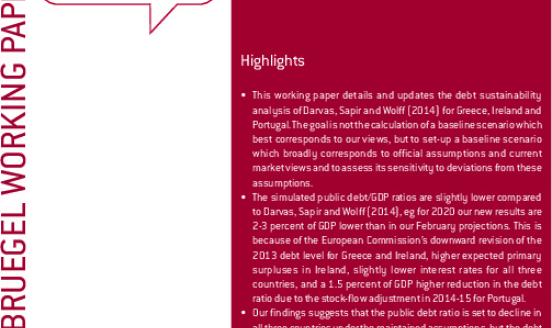
The long haul: debt sustainability analysis
The public debt ratio is set to decline in Greece, Ireland and Portugal under the maintained assumptions, but the debt trajectory remains vu
The G20's financial reform agenda
Secular stagnation in today's economy. How can it be addressed?
ECB shows activism but falls short of true QE
Overall, we welcome that the ECB has finally acted with a broad package. We also think that unanimity on the package was a very positive development a
Negative ECB deposit rate: But what next?
The main question for Thursday is what other measures will be deployed by the ECB’s Governing Council, and perhaps even more importantly, if Mr Draghi
Addressing weak inflation: The ECB’s shopping list
In this blogpost, we summarize our recently published paper, in which we discuss in detail the dilemmas for the ECB and the need to act. Inflation for
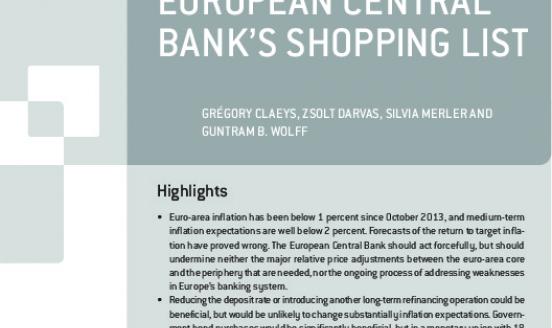
Addressing weak inflation: The European Central Bank's shopping list
Euro-area inflation has been below 1 percent since October 2013, and medium-term inflation expectations are well below 2 percent. Forecasts of the ret
10 years EU enlargement anniversary: Waltzing past Vienna
Since their accession to the European Union ten years ago, something extraordinary has been going on in Central European capitals. Measured in purchas
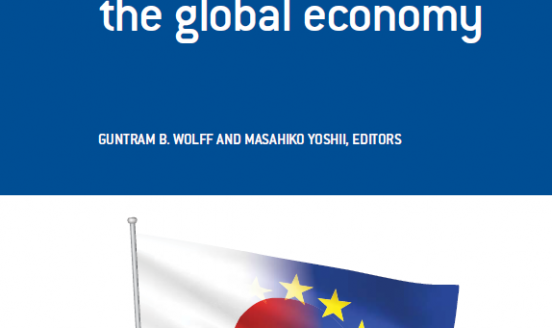
Japan and the EU in the global economy
This report analyses economic issues facing Japan and Europe. It identifies some of the channels through which Europe can learn from Japan, and viceve
Ukraine's currency crash
It's therefore fair to say that Ukraine’s economic challenges are mounting, yet the current critical situation of the country also provides a gre
Taylor-rule interest rates for euro area countries: diversity remains
Despite the very low headline (0.5%) and core (0.8%) inflation figures for March 2014, the Taylor-rule recommendation for the euro area has in fact sl
Europe's social problems
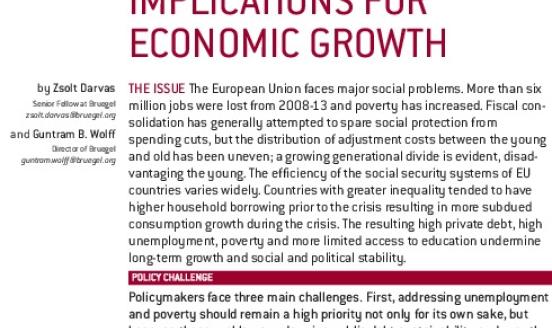
Europe's social problem and its implications for economic growth
The European Union faces major social problems. More than six million jobs were lost from 2008-13 and poverty has increased. Fiscal consolidation has
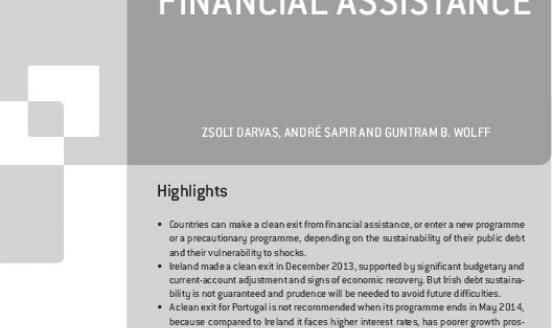
The long haul: managing exit from financial assistance
Countries can make a clean exit from financial assistance, or enter a new programme or a precautionary programme, depending on the sustainability of t
The troika and financial assistance in the euro area
Inflation persistence in central and eastern European countries
This article studies inflation persistence with time-varying coefficient autoregressions for 12 central European countries in comparison with the Unit
In sickness and in health: protecting and supporting public investment in Europe
While the long term decline in gross public investment in core EU countries is generally in line with developments in other advanced countries, recent
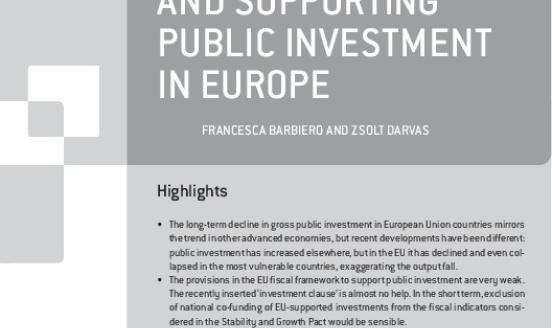
In sickness and in health: protecting and supporting public investment in Europe
The long-term decline in gross public investment in European Union countries mirrors the trend in other advanced economies, but recent developments ha
Export and unit labour cost adjustment: close association in EU15
We have updated, up to 2013Q2, our database on quarterly unit labour cost (ULC) based real effective exchange rate (REER) indices.
Bruegel year in review - 2013
Why should Germany reduce its current-account surplus?
The German trade surplus may widen with the euro-area recovery
An increased demand for German exports may well lead to an increased overall German trade surplus, unless German domestic demand increases significant
Which role should the ECB give up?
In a briefing paper written for the European Parliament’s Monetary Dialogue with ECB President Draghi, we look at old and new competences of
Mind the gap! And the way structural budget balances are calculated*
The so-called structural balance of the general government aims to measure the ‘underlying’ position of the budget by excluding the impact of the econ
Large banks relative to GDP: is there a risk beyond Cyprus?
Are other EU countries with large bank balance sheet relative to GDP also running a risk similar to Cyprus? The answer is no. The major reason for the
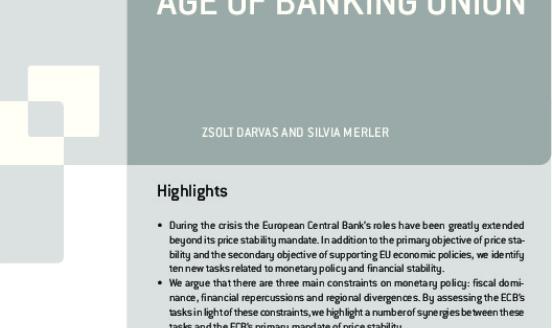
The European Central Bank in the age of banking union
This Policy Contribution was prepared for the European Parliament's 'Monetary Dialogue with the President of the European Central Bank Mario Draghi. D
Insufficient home-assignments from the European Semester
Does the European Semester deliver the right policy advice to the euro area? Unfortunately, we find the recommendations disappointing, for a
Balancing the new and old roles of the ECB
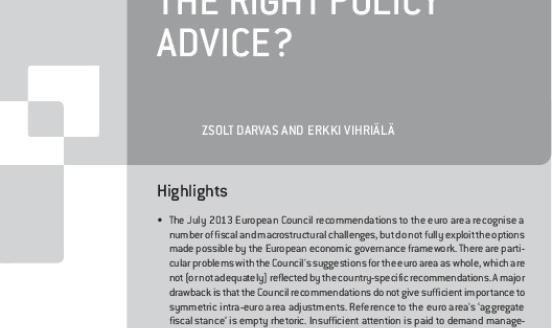
Does the European Semester deliver the right policy advice?
This Policy Contribution was prepared for the European Parliament's 'Economic Dialogue with the President of the Eurogroup' Jeroen Djisselbloem'. The
The mismatch between euro-area and country-specific recommendations
-15% to +4%: Taylor-rule interest rates for euro area countries
Does one size fit all? Before the crisis, there was a major debate on whether the single interest rate set by the European Central Bank (ECB) would be
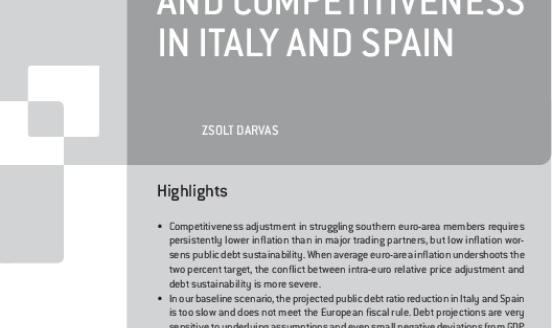
The euro area's tightrope walk: debt and competitiveness in Italy and Spain
Competitiveness adjustment in struggling southern euro-area members requires persistently lower inflation than in major trading partners, but low
Good news from Cyprus: Q2 contraction only 1.4 percent
There was a great news in the Eurostat release of the GDP flash estimate for the second quarter of 2013, which was not much highlighted: the
Yields on the rise
US government bond yields have increased recently, mainly due to the talks about tapering the Federal Reserve’s quantitative easing (QE) programme. Th
Recent real effective exchange rate movements (summer 2013 database update)
We have updated the monthly database up to July 2013, which is downloadable form the website of the working paper.
Eurozone adjustment - economic growth & fiscal sustainability
Dramatic days ahead in Cyprus
The Cypriot parliament's Tuesday evening rejection of the bank levy on bank deposits, which was a key condition for financial assistance from the EU/I
To bail-in, or not to bail-in: that is the question (now for Cyprus)
There is an intense debate on the possibility of bailing-in bank shareholders and lenders of troubled financial institutions (ie forcing investors to
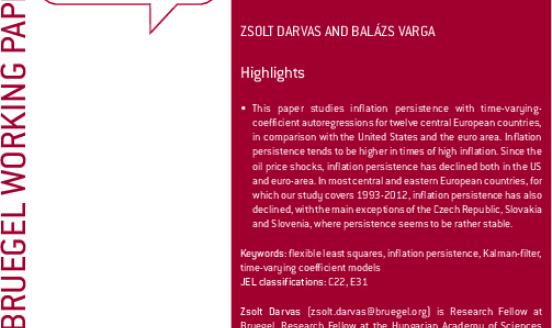
Inflation persistence in Central and Eastern European countries
This paper studies inflation persistence with time-varying coefficient autoregressions for twelve central European countries,in comparison w
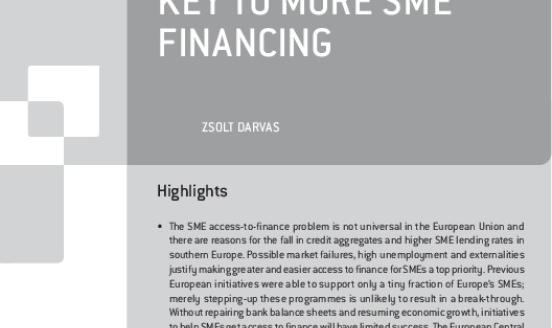
Banking system soundness is the key to more SME financing
This briefing paper was prepared for the European Parliament Committee on Economic and Monetary Affairs ahead of the European Parliament’s Monetary Di
Access to finance for SMEs in Europe

Hearing on 'EU budget contribution to public investment in Europe'
Where does the youth exodus come from?
Intra-EU migration increased before the crisis, especially into booming countries like Ireland and Spain. What happened during the crisis?
Europa droht eine verlorene Dekade
Bruegel-Forscher Zsolt Darvas über die schädlichen Folgen aktueller Konjunkturprobleme für das langfristige Wachstum.
Latvia's move to join the euro is right for the country
The harmful impact of short-term troubles on long-term growth
Eurostat published yesterday the flash GDP growth estimates for the first quarter of 2013: euro-area GDP is down by 0.2% compared with the previous qu
Will Slovenia need a bail-out?
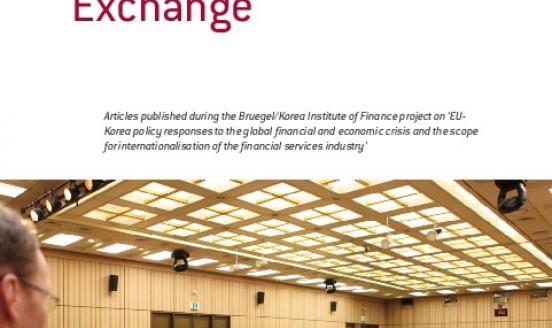
EU-Korea Economic Exchange
Articles published during the Bruegel/Korea Institute of Finance project on ‘EU-Korea policy responses to the global financial and economic crisis and
Europe’s banks need to be recapitalised – now
Europe’s growth performance was disappointing before the financial crisis. It has been dismal since. Five years into the “great recession”, the r
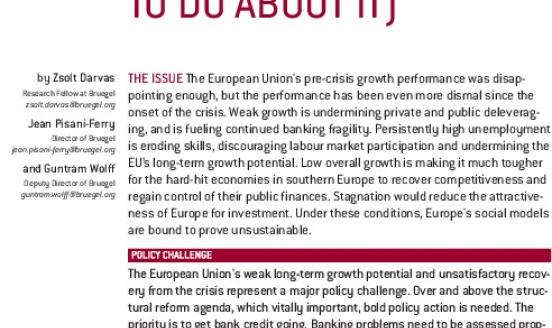
Europe's growth problem (and what to do about it)
The issue: The European Union's pre-crisis growth performance was disappointingenough, but the performance has been even more dismal since theonset of
Time for us to bank on a new Marshall Plan
Almost like a bolt from the blue, the Eurogroup meeting of euro-area finance ministers, along with the troika of the European Commission, the Europe
It is not yet too late to drop the idea of capital controls in Cyprus
The Cypriot finance minister Michael Sarris yesterday announced that Cyprus would introduce capital controls (see an FT report here). He announced tha
The new Cyprus deal: victory of common sense
The new deal on Cyprus does not only have the right intentions, but averts the two major flaws of the previous deal: It fully protects
What comes after finance in Cyprus?
The prominent role of Cyprus's financial services is probably over anyway, irrespective of the actual content of the forthcoming agreement between the
Options for Cyprus
Cypriot government official and parliamentary members face major choices in the next few hours: the European Central Bank (ECB) concluded that it will
No contagion from Cyprus so far
The Cyprus drama has not destabilised the rest of the eruo area so far, despite the talks about a possible ‘Cyprexit’, i.e. an exit of Cyprus form the
Cyprus deal: the right intentions but major flaws
On Saturday morning, after a marathon meeting of the Eurogoup, it was decided to impose a one-time wealth tax on deposits in Cypriot banks: 6.75%
Should non-euro area countries join the single supervisory mechanism?
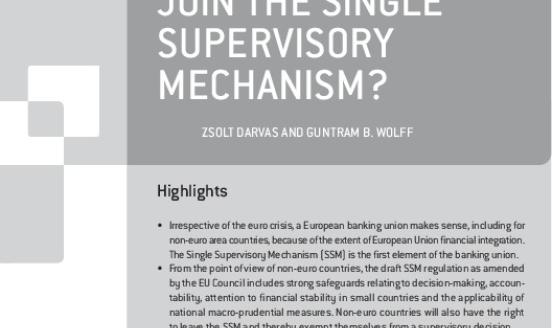
Should non-euro area countries join the single supervisory mechanism?
This Policy Contribution was prepared for a hearing on The economic crisis and the development of the European Union at the Danish Parliament on 26 Fe
A new direction for euro-area macro policies
The debate on austerity in Europe has intensified after the publication of disappointing growth data for last year. The debate has been given further
The Euro Crisis: Mission Accomplished?*
High unemployment, bleak economic outlook, high public and private debts, dysfunctional banks, weak competitiveness, and an unfavorable external envir
The implications of the weakening Yen*
The recent trend of the weakening Japanese yen reflects a major policy shift in Japan, following the formation of the government of prime minister Shi
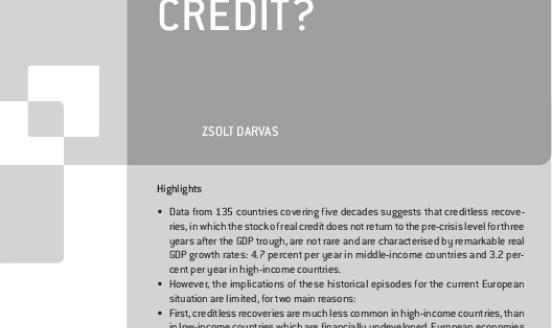
Can Europe recover without credit?
Data from 135 countries covering five decades suggests that creditless recoveries, in which the stock of real credit does not return to the pre-crisis
Chart of the week: The real test of the euro
Yen at war
The year of Ireland?
Ireland has assumed the role of the Presidency of the Council of European Union for the first half of 2013, which will likely attract more a
Real exchange rate adjustments around the globe
Real effective exchange rate adjustment trends in the aftermath of the global financial and economic crisis were generally not out of line with histor
3 expectations for the euro area in 2013
Chart of the week: updated monthly real effective exchange rates for 153 countries and the euro area
Greek glass: half-empty or half-full?
The Greek debt trap: missing the wrong target
Filling Europe’s bottomless pit
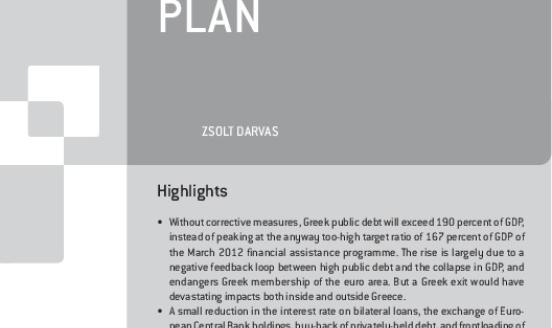
The Greek debt trap: an escape plan
Without corrective measures, Greek public debt will exceed 190 percent of GDP, instead of peaking at the anyway too-high target ratio of 167 percent o
The Greek debt trap: an escape plan
Chart of the week: the ECB’s power on Spanish and Italian bond yields
The euro crisis: ten roots, but fewer solutions
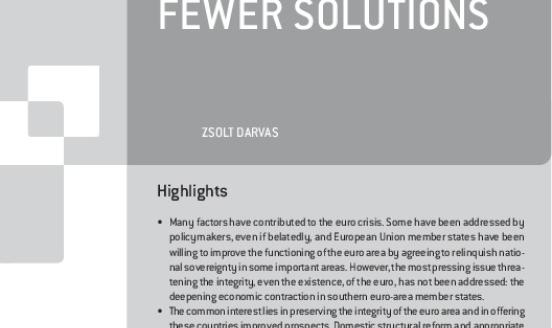
The euro crisis: ten roots, but fewer solutions
Many factors have contributed to the euro crisis. Some have been addressed by policymakers, even if belatedly, and European Union member states have b
The Spanish minefield and the Gretomic bomb have not yet been inactivated
The ECB’s Magic Wand
The limits of a purely intra-euro rebalancing strategy
The need to rebalance the debts of several Eurozone members is a major root of the current crisis. This column argues that a purely intra-euro reb
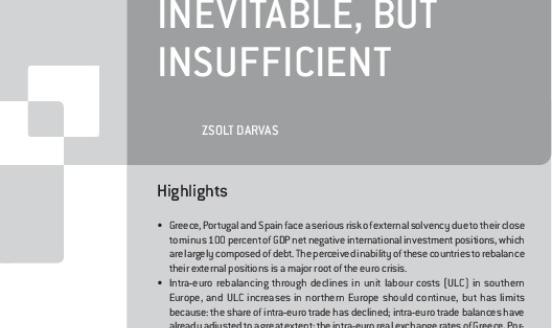
Intra-euro rebalancing is inevitable but insufficient
Greece, Portugal and Spain face a serious risk of external solvency due to their close to minus 100 percent of GDP net negative international invest
Firefighting has limits
Weathering the Storm in Central Europe
Poland is the winner among 24 EU countries in a ranking based on the stability and growth of five indicators (production, productivity, employment,
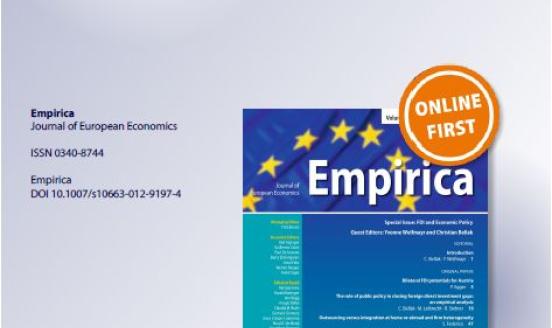
Monetary transmission in three central European economies: evidence from time-varying coefficient vector autoregressions
Are wages too high in the French automobile industry?
Devaluation and internal adjustment of the real exchange rate
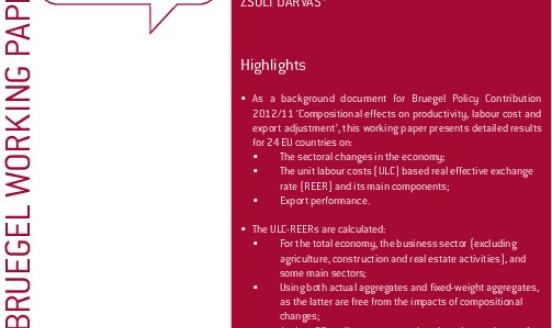
Productivity, labour cost and export adjustment: Detailed results for 24 EU countries
As a background document for the Policy Contribution ‘Compositional effects on productivity, labour cost and export adjustment’, this working paper pr
Addressing internal adjustment in the euro area
Internal adjustment of the real exchange rate: Does it work?
The forefathers of Europe’s single currency argued that rather than devalue their currencies to restore competitiveness, countries could devalue ‘in
On the efficacy of internal devaluations: answers to the questions of Kevin O’Rourke
Europa muss Griechenland eine Zukunft bieten
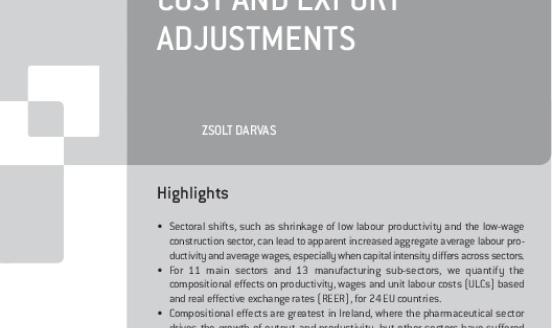
Compositional effects on productivity, labour cost and export adjustments
Sectoral shifts, such as shrinkage of low labour productivity and the low-wage construction sector, can lead to apparent increased aggregate average l
Greece after the elections
Europe must offer Greece a post-election prospect
The euro might survive. But a cooperative Greek government, a real European programme to support Greek economic growth and a resolution of the Greek p
Chart of the week: Intra-euro rebalancing has started
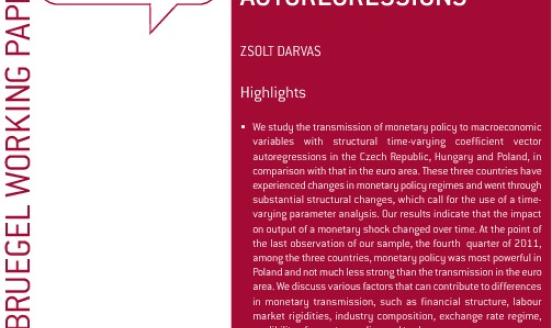
Monetary transmission in three central European economies: evidence from time-varying coefficient vector autoregressions
This is a study of the transmission of monetary policy to macroeconomic variables with structural time-varying coefficient vector autoregressions in
The new Dutch disease
Hungary is no Turkey
Chart of the Week - Competitiveness adjustment in euro-area periphery
World Wide Rates
In a recent Bruegel Working Paper I calculated trade-weighted real effective exchange rates (REERs) for 178 countries – many more than in any other
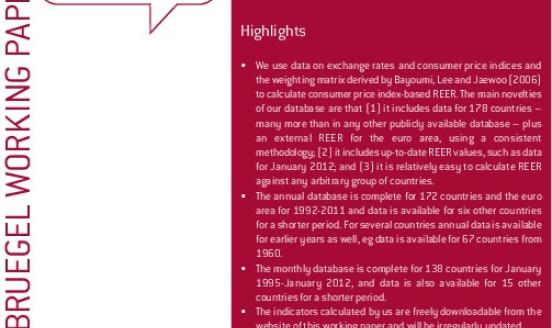
Real effective exchange rates for 178 countries: a new database
Using data on exchange rates and consumer price indices and a weighting matrix, we calculate up-to-date consumer price index-based REER (the real effe
Will cohesion fund disbursement be suspended for Hungary?
The Greek tragedy: what next?
Prospects for the yen carry trade
Weathering the storm: differences in crisis response in the EU and Korea
Will the US dollar be dethroned as the global currency?
The ten roots of the euro crisis
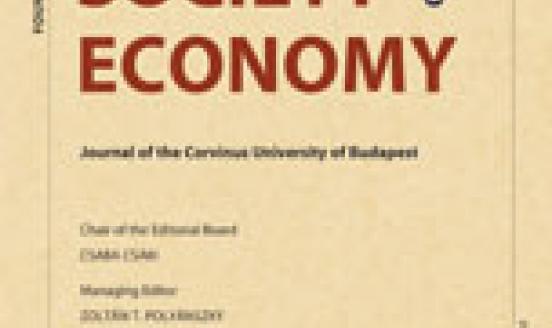
Financial transaction tax: Small is beautiful
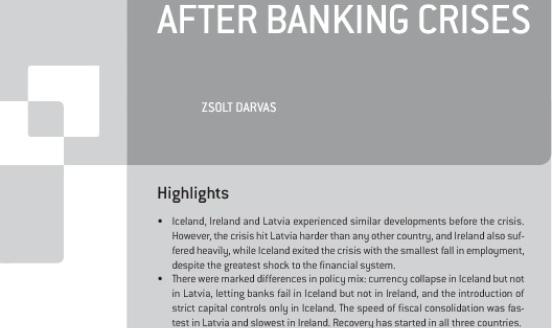
A tale of three countries: recovery after banking crises
The purpose of this Policy Contribution is to compare the policy responses in, and the adjustments made byIceland, Ireland and Latvia. Based on this
Élet a bankválság után (Life after banking crises)
The summit of survival
Will the euro survive 2012?
Greece after the referendum
Egy csúcs a sok közül?
The Greek public debt misery: the right cure should follow the right diagnosis
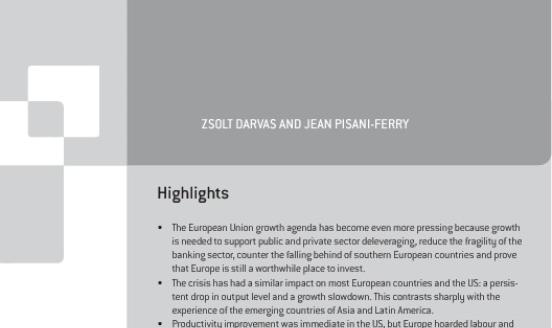
Europe's growth emergency
This Policy Contribution puts forward policy recommendations to move towards growth rebuilding in the EU, reducing the fragility of the European ban
An alternative to the Hungarian mortgage loan repayment proposal
Greece: quo vadis?
The euro’s last-chance saloon
Should Italy go flop, the most palatable solution would be a limited Eurobond up to 60 percent of GDP. This should be phased in through complete pooli
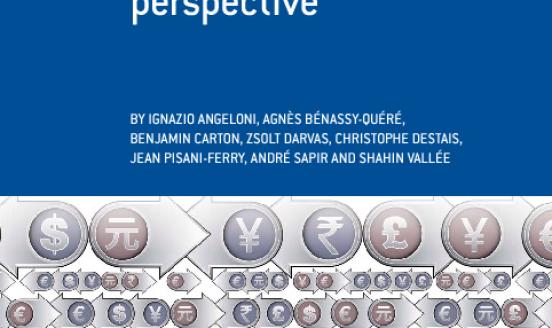
Global currencies for tomorrow: a European perspective
Fiscal and Monetary Institutions in Central, Eastern and South-Eastern European Countries
'Debt socialisation' might follow Greek crisis
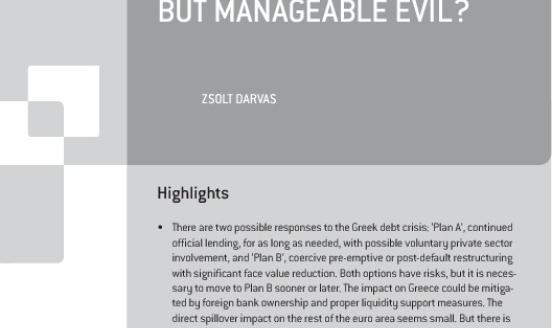
Debt restructuring in the euro area: A necessary but manageable evil?
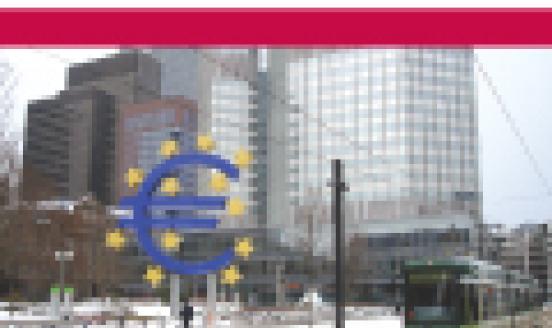
Exchange Rate Policy and Economic Growth after the Financial Crisis in Central and Eastern Europe
Debt default by EU governments?
Unsinkable like the Titanic
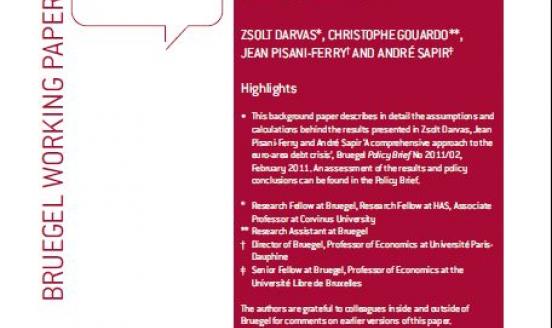
A comprehensive approach to the euro-area crisis: Background calculations
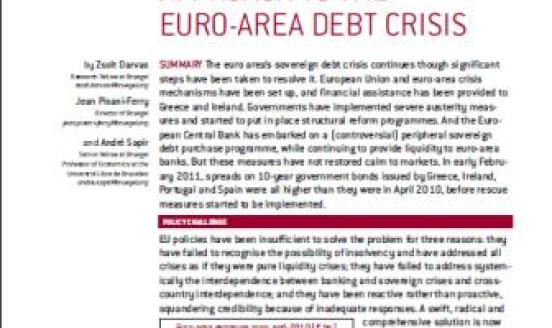
A comprehensive approach to the euro-area debt crisis
Zsolt Darvas, André Sapir and Jean Pisani-Ferry propose a comprehensive solution to the current European crisis based on three pillars.
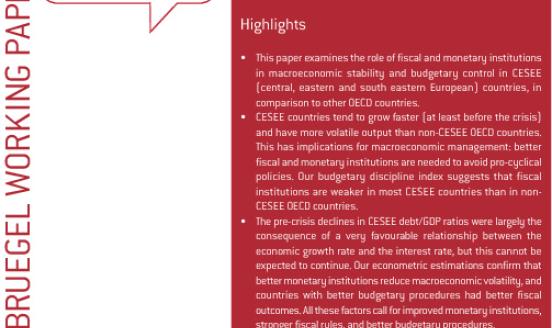
The fiscal and monetary institutions of CESEE countries
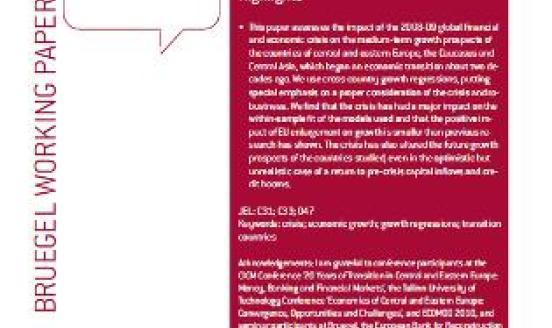
Beyond the crisis: prospects for emerging Europe
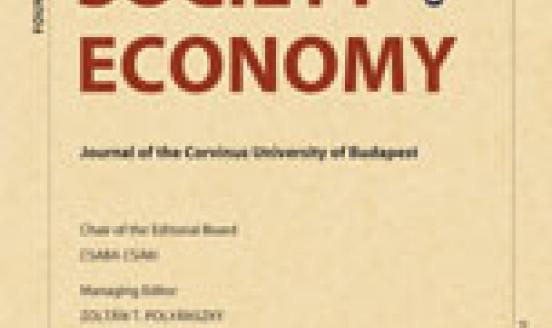
The case for reforming euro area entry criteria

The threat of 'currency wars': a European perspective
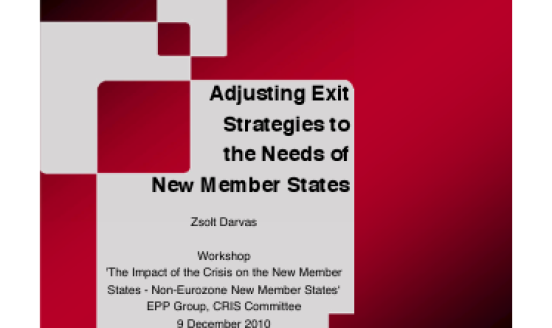
Adjusting Exit Strategies to the Needs of New Member States
'The Impact of the Crisis on the New Member States - Non-Eurozone New Member States‘
EPP Group, CRIS Committee 9 December 2010
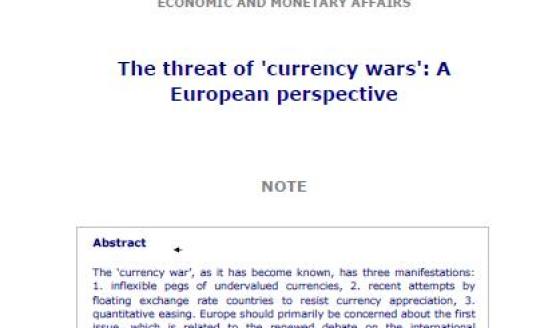
The threat of "currency wars"
Szétzilálja-e az eurózónát az adósságválság?
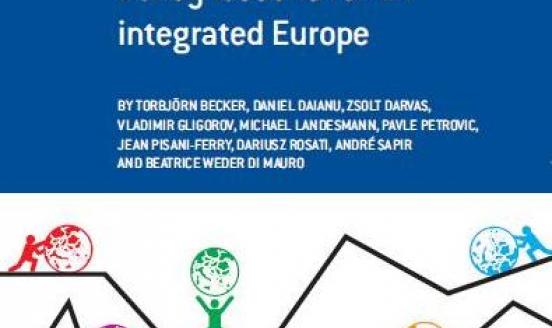
Whither growth in central and eastern Europe? Policy lessons for an integrated Europe

Facts and lessons from euro area divergences for enlargement
The euro conundrum
Europe’s role in global imbalances
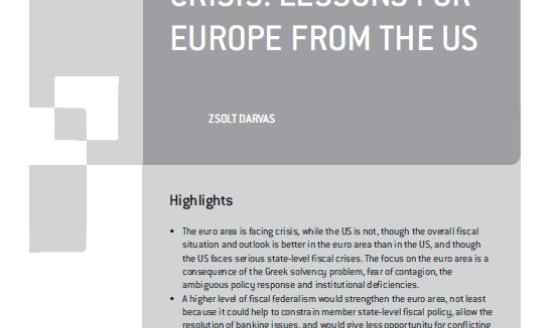
Fiscal federalism in crisis: lessons for Europe from the US
Drawing comparisons between the fiscal architecture and situation in the US and the European Union, Bruegel Research Fellow Zsolt Darvas answers three
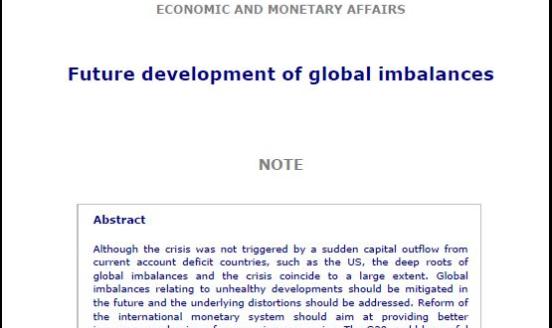
Future developments of global imbalances
This document was requested by the European Parliament’s Committee on Economic and Monetary Affairs.
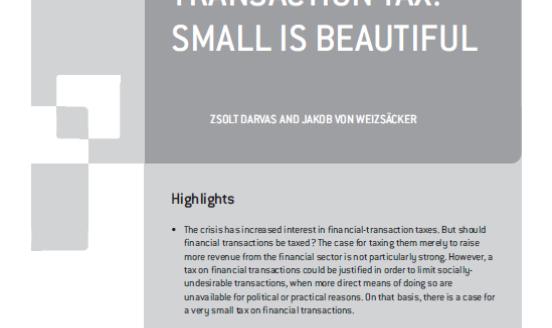
Financial-Transaction Tax: Small Is Beautiful
Lessons From the Euro Area
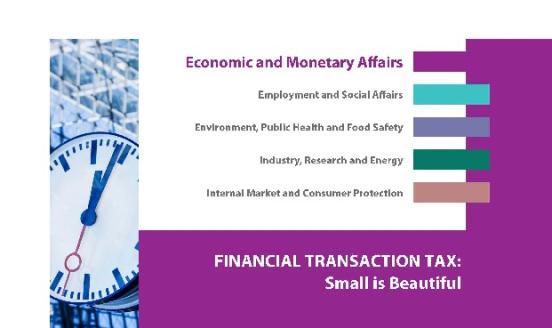
Financial Transaction Tax: Small is Beautiful
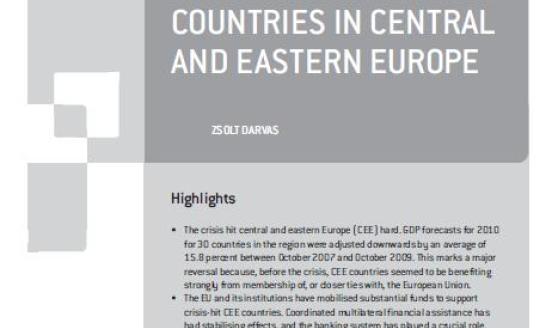
The EU's Role in Supporting Crisis-Hit Countries in Central and Eastern Europe
The Baltic Misery Needs a Solution
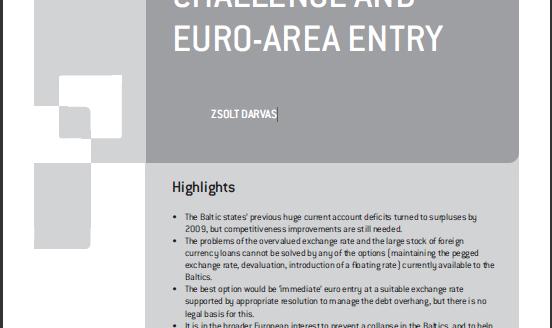
The Baltic Challenge and Euro-Area Entry
Après l'euphorie, l'addition

Memos to the new Commission- Europe's economic priorities 2010-2015
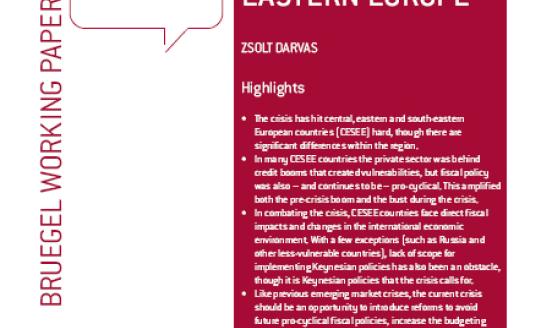
The impact of the crisis on budget policy in Central and Eastern Europe
Treaty change is needed to make sense of euro-area entry criteria
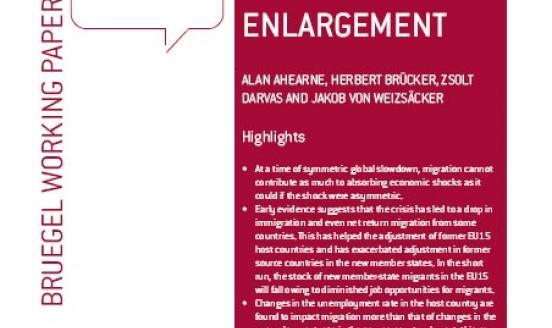
Cyclical dimensions of labour mobility after EU Enlargement
When will crisis end?
Eastern European currencies need help now
The looming divide within Europe
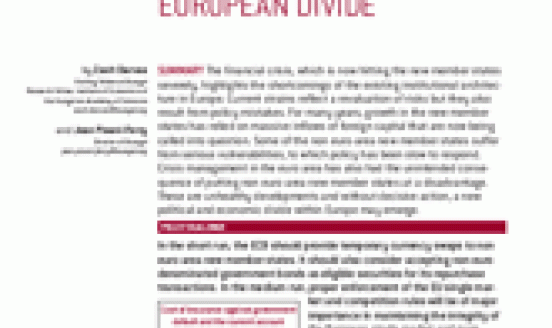
Avoiding a new European divide
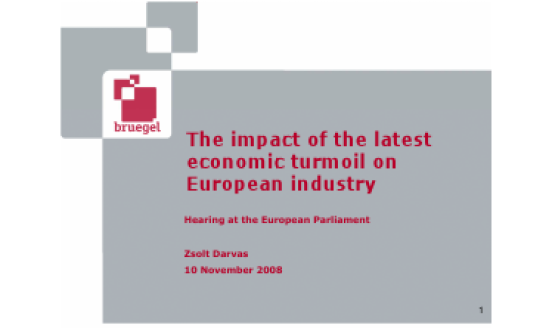
The impact of the latest economic turmoil on European industry
Hearing at the European Parliament